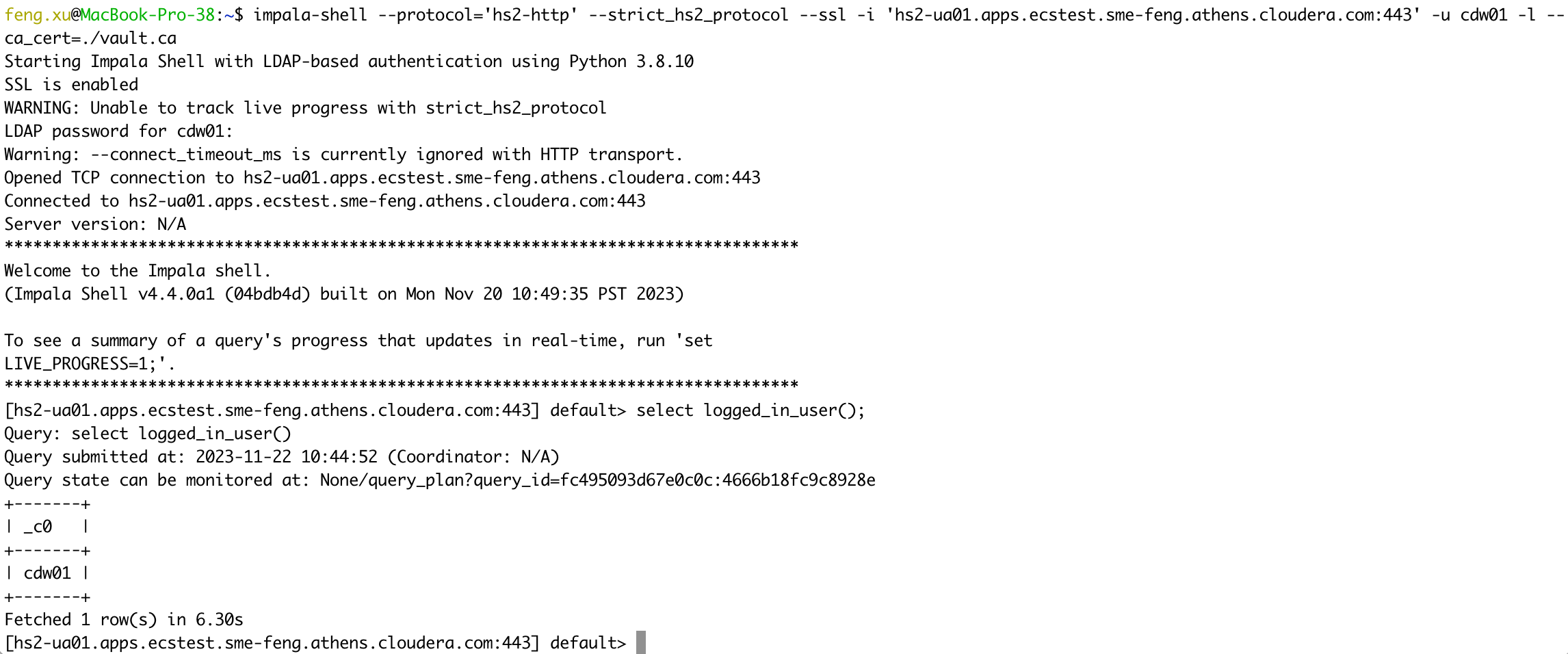Hadoop Clients Setup on MacOSX
- 1. Introduction to the test environment
- 2. Basic Concept
- 3. Hadoop Clients Setup on MacOSX
- 4. Validate Beeline
- 4.1 Case 01 - Hive on Tez(Base Cluster) + Kerberos auth
- 4.2 Case 02 - Hive on Tez(Base Cluster) + LDAP auth
- 4.3 Case 03 - Hive LLAP(CDW) + Kerberos auth
- 4.4 Case 04 - Hive LLAP(CDW) + LDAP auth
- 4.5 Case 05 - Impala(Base Cluster) + Kerberos auth
- 4.6 Case 06 - Impala(Base Cluster) + LDAP auth
- 4.7 Case 07 - Impala(CDW) + Kerberos auth
- 4.8 Case 08 - Impala(CDW) + LDAP auth
- 4.9 Case 09 - Unified Analytics(CDW) + Kerberos auth
- 4.10 Case 10 - Unified Analytics(CDW) + LDAP auth
- 5. Validate impala-shell
1. Introduction to the test environment
| MAC OS version | 13.1 (22C65) |
| Processor Type | Intel Core i7 |
| Java version | 11.0.18 |
| Python version | 3.8.10 |
| Beeline version | 3.1.3000 |
| Impala-shell version | 4.4.0a1 |
| CDP Runtime version | CDP PvC Base 7.1.7 SP2 |
| CM version | Cloudera Manager 7.11.3.2 |
| ECS version | CDP PvC DataServices 1.5.2 |
2. Basic Concept
- In a secured CDP environment there are different alternatives available for clients to authenticate with the cluster. In this article we will look into the different authentication mechanisms and their configuration details:
- Kerberos authentication
- Kerberos is by far the most common option we see being used in the field to secure CDP clusters. It enables users to use their corporate identities, stored in services like Active Directory and RedHat IPA/FreeIPA, which simplifies identity management. A kerberized CDP cluster also makes it easier to integrate with other services in the Hadoop ecosystem, which also use Kerberos for strong authentication. Kerberos uses shared key cryptography through a ticket-based authentication system, whereby tickets are issued, encrypted, and decrypted by a key distribution center (KDC).
- LDAP authentication
- LDAP authentication can also be used for authentication with the CDP cluster, instead of Kerberos. This eliminates some of the complexity related to Kerberos, like requiring Kerberos libraries to be installed for the client and issues when Load Balancers are used. When LDAP is used for authentication, differently from the Kerberos protocol, the beeline/impala-shell client needs to send the username and password over the network. Password files are often used to avoid password leaks.
- Kerberos authentication
- PvC CDW virtual warehouses support Kerberos authentication from PvC 1.5.0 (Jan 2023), there are some limitations about beeline version, impala-shell version and commandline attributes.
- You must use the beeline CLI(
3.1.3000.2023.0.14.0-84or later) downloaded from the PVC DS DW UI. Otherwise the connection will fail with errors “HTTP Response code: 404 (state=08S01,code=0)”. The downloaded Beeline itself already contains the open source Hive JDBC driver. The open source Hive JDBC driver uses Java Authentication and Authorization Service (JAAS) standard, which requires either a config file OR the use of a JVM property (-Djavax.security.auth.useSubjectCredsOnly=false) to enable the use of the Kerberos ticket cache. - You must add the
kerberosEnableCanonicalHostnameCheck=falseoption in the hive jdbc url. ThekerberosEnableCanonicalHostnameCheckoption disables the reverse dns check implemented in the jdbc driver. There is no need for this in PVC Base, because the reverse dns records must be correct there for the cluster nodes (otherwise Kerberos does not work between cluster services). So this is a DS specific functionality and it was not backported from the upstream hive code to the PVC Base jdbc drivers, which is why Kerberos auth does not work with the drivers installed on Base nodes towards PVC DS Virtual Warehouses. - You must use impala-shell(
4.4.0a1or later) to access Impala virtual warehouse when using Kerberos authentication. - Long story short: please do
NOTuse the built-in beeline or impala-shell client in PvC Base Cluster to access CDW virtual warehouses with Kerberos authentication.
- You must use the beeline CLI(
3. Hadoop Clients Setup on MacOSX
3.1. Install OpenJDK 11
brew install openjdk@11
$ java -version
openjdk version "11.0.18" 2023-01-17
OpenJDK Runtime Environment Homebrew (build 11.0.18+0)
OpenJDK 64-Bit Server VM Homebrew (build 11.0.18+0, mixed mode)
3.2. Install Python 3.8.10
- To install python 3.8.10 on MacOS, please download the installer from python official download site.
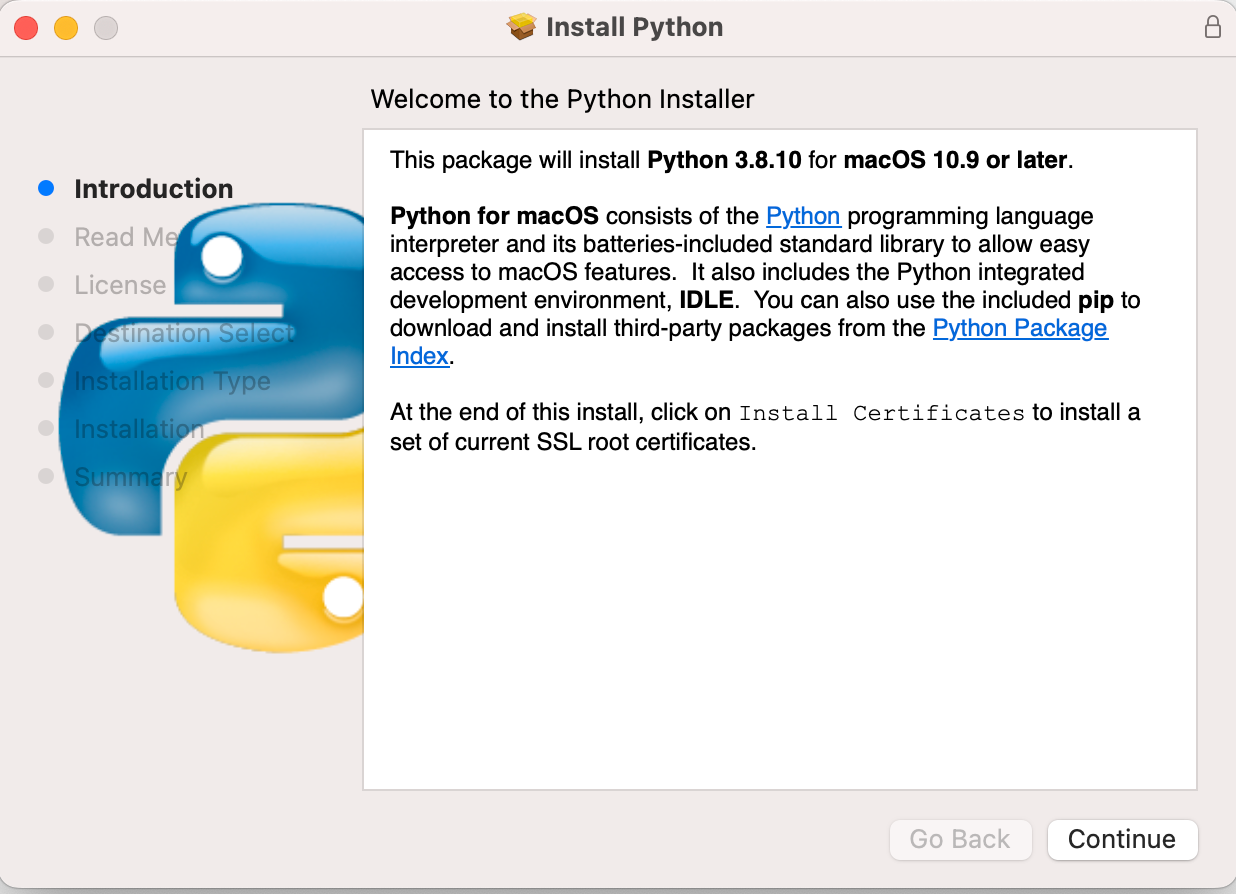
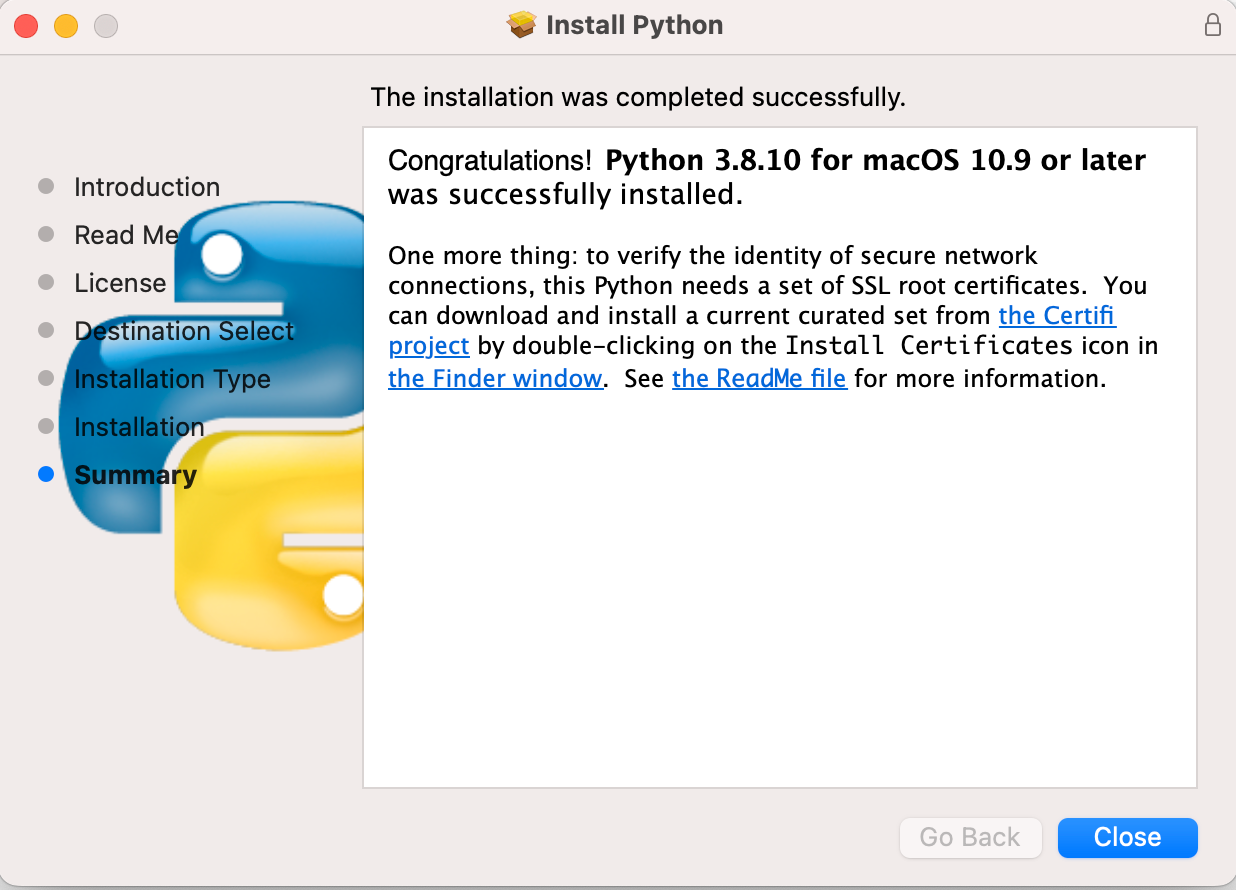
3.3 Install Beeline 3.1.3
Note: To use Kerberos auth in PvC DS you must use the latest beeline CLI(3.1.3000.2023.0.14.0-84) downloaded from the PVC DS DW UI.
In order to connect to Hive VW via beeline shell, the first step is to download Beeline CLI software. “Guides and More” is on the Cloudera Data Warehouse Overview. Navigate to Cloudera Data Warehouse > Overveiw > Resources and Downloads and click on the “see more” button, you can see “Downloads - Beeline CLI”. You can also download it from Hive3 website.
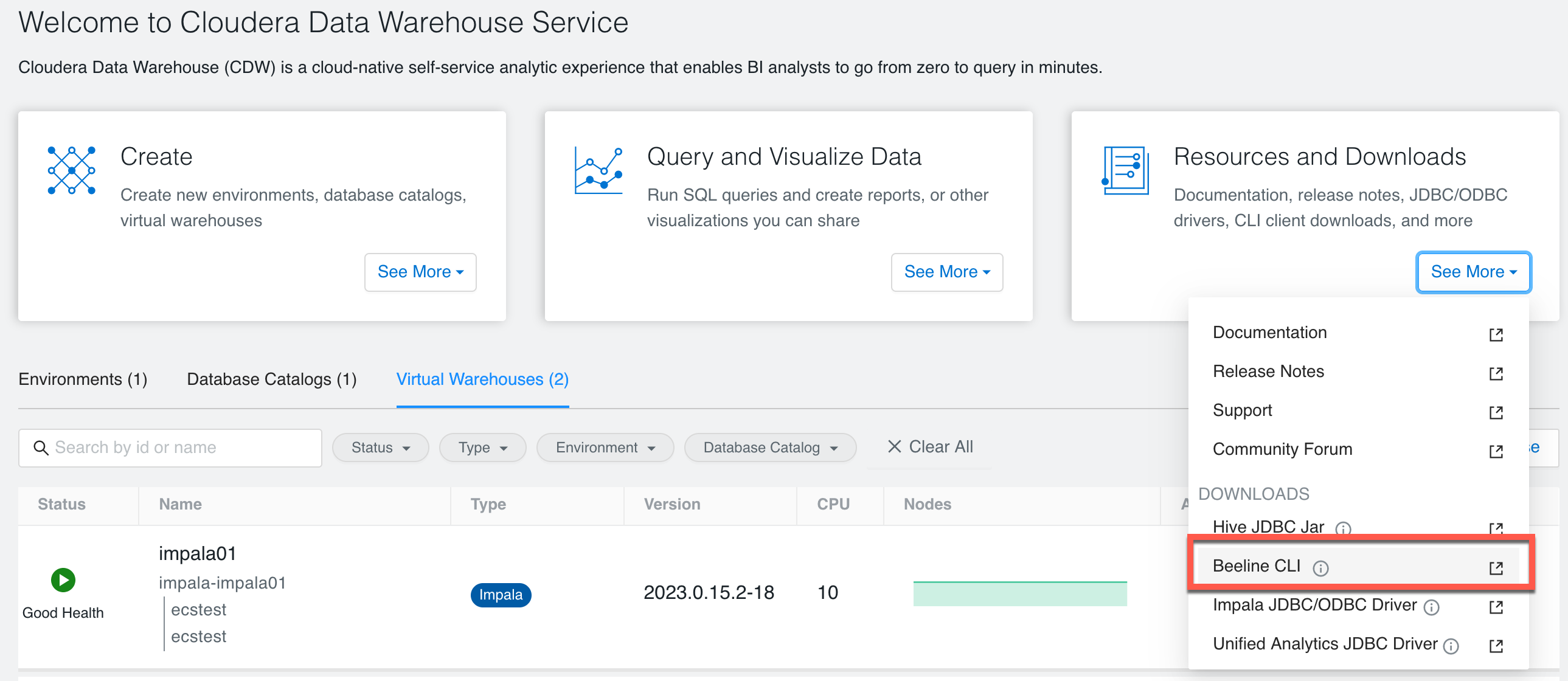
- Extract the tar.gz file, and you will see two folders, bin & lib
mkdir -p $HOME/hadoop-clients tar xvzf apache-hive-beeline-3.1.3000.tar.gz -C $HOME/hadoop-clients cd $HOME/hadoop-clients ln -s apache-hive-beeline-3.1.3000.2023.0.14.0-84 beeline
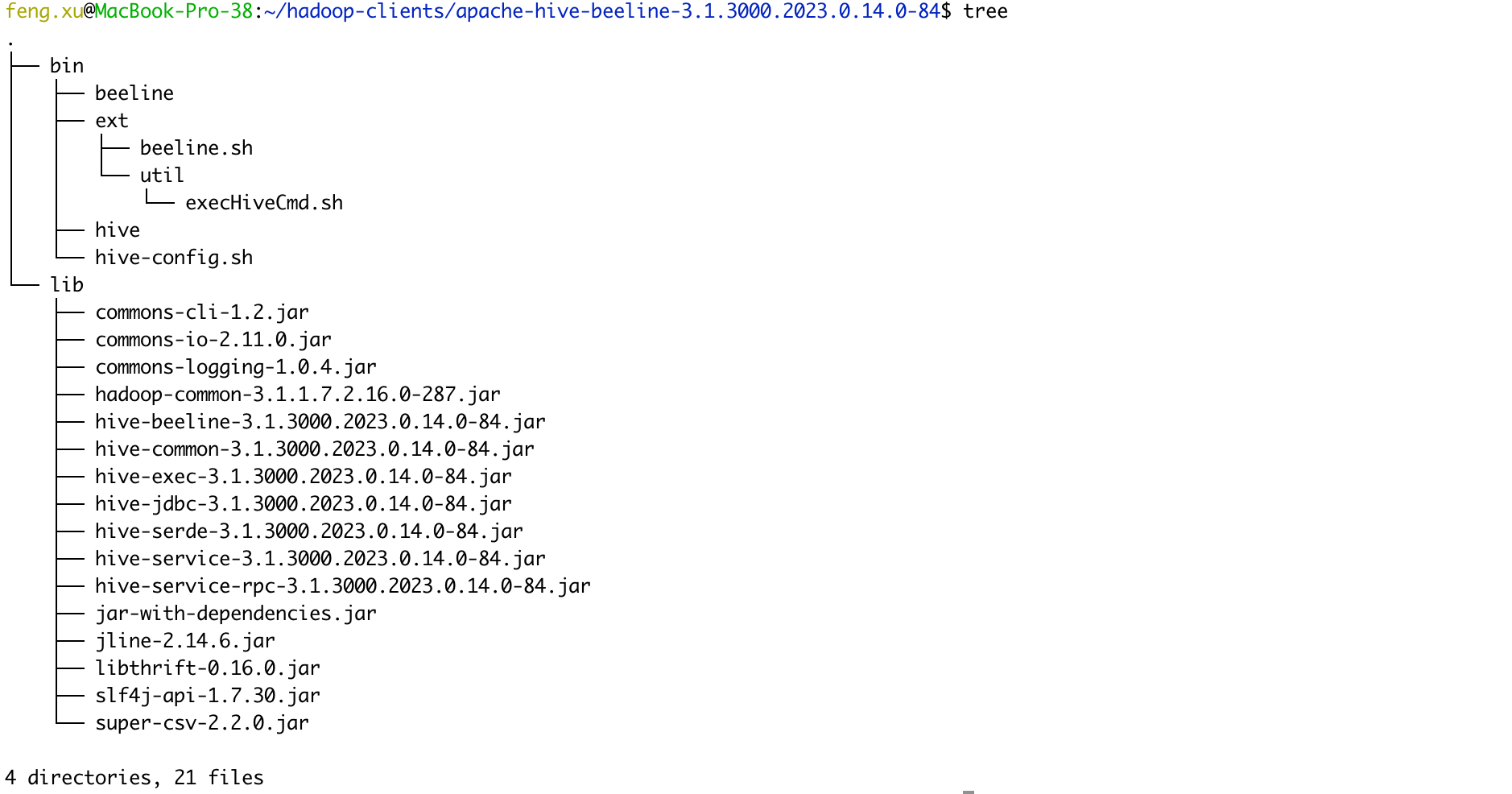
3.4 Download Hive/Impala jdbc drivers
- You can download hive/impala jdbc drivers from the same location as Beeline CLI.
- Hive jdbc Jar is Cloudera provided enterprise driver
hive-jdbc-3.1.0-SNAPSHOT-standalone.jar. - Impala JDBC/ODBC Driver is
impala_driver_odbc_jdbc.zip. You can extract it and get the latest impala jdbc driverImpalaJDBC42.jar. - Unified Analytics JDBC Driver is same as Hive jdbc Jar.
- Hive jdbc Jar is Cloudera provided enterprise driver
mkdir -p $HOME/hadoop-clients/drivers
ls -l $HOME/hadoop-clients/drivers
total 200624
-rw-rw-r--@ 1 feng.xu staff 11597118 Jul 7 08:18 ImpalaJDBC42.jar
-rw-r--r--@ 1 feng.xu staff 91116291 Nov 11 22:04 hive-jdbc-3.1.0-SNAPSHOT-standalone.jar
3.5. Install Impala-shell 4.4.0a1
- Impala shell can be invoked on a remote client machine by installing the impala-shell package. It is a python package that can be installed using pip.
- Note: Kerberos authentication requires impala-shell version 4.4.0a1 or later (https://pypi.org/project/impala-shell/4.4.0a1/).
$ which python3
/Library/Frameworks/Python.framework/Versions/3.8/bin/python3
$ python3 -V
Python 3.8.10
$ pip3 -V
pip 21.1.1 from /Library/Frameworks/Python.framework/Versions/3.8/lib/python3.8/site-packages/pip (python 3.8)
$ pip3 install impala-shell==4.4.0a1
Collecting impala-shell==4.4.0a1
Downloading impala_shell-4.4.0a1.tar.gz (489 kB)
|| 489 kB 320 kB/s
Collecting bitarray==2.3.0
Using cached bitarray-2.3.0.tar.gz (87 kB)
Collecting configparser==4.0.2
Using cached configparser-4.0.2-py2.py3-none-any.whl (22 kB)
Collecting kerberos==1.3.1
Using cached kerberos-1.3.1-cp38-cp38-macosx_10_15_x86_64.whl (33 kB)
Collecting prettytable==0.7.2
Using cached prettytable-0.7.2-py3-none-any.whl
Collecting sasl==0.3.1
Using cached sasl-0.3.1.tar.gz (44 kB)
Requirement already satisfied: setuptools>=36.8.0 in /Library/Frameworks/Python.framework/Versions/3.8/lib/python3.8/site-packages (from impala-shell==4.4.0a1) (56.0.0)
Collecting six==1.14.0
Using cached six-1.14.0-py2.py3-none-any.whl (10 kB)
Collecting sqlparse==0.3.1
Using cached sqlparse-0.3.1-py2.py3-none-any.whl (40 kB)
Collecting thrift==0.16.0
Using cached thrift-0.16.0.tar.gz (59 kB)
Collecting thrift_sasl==0.4.3
Using cached thrift_sasl-0.4.3-py2.py3-none-any.whl (8.3 kB)
Collecting pure-sasl>=0.6.2
Using cached pure_sasl-0.6.2-py3-none-any.whl
Using legacy 'setup.py install' for impala-shell, since package 'wheel' is not installed.
Using legacy 'setup.py install' for bitarray, since package 'wheel' is not installed.
Using legacy 'setup.py install' for sasl, since package 'wheel' is not installed.
Using legacy 'setup.py install' for thrift, since package 'wheel' is not installed.
Installing collected packages: six, thrift, pure-sasl, thrift-sasl, sqlparse, sasl, prettytable, kerberos, configparser, bitarray, impala-shell
Running setup.py install for thrift ... done
Running setup.py install for sasl ... done
Running setup.py install for bitarray ... done
Running setup.py install for impala-shell ... done
Successfully installed bitarray-2.3.0 configparser-4.0.2 impala-shell-4.4.0a1 kerberos-1.3.1 prettytable-0.7.2 pure-sasl-0.6.2 sasl-0.3.1 six-1.14.0 sqlparse-0.3.1 thrift-0.16.0 thrift-sasl-0.4.3
WARNING: You are using pip version 21.1.1; however, version 23.3.1 is available.
You should consider upgrading via the '/Library/Frameworks/Python.framework/Versions/3.8/bin/python3.8 -m pip install --upgrade pip' command.
- Please ensure that impala-shell runs on python 3.8 environment.
$ which impala-shell
/Library/Frameworks/Python.framework/Versions/3.8/bin/impala-shell
$ impala-shell -v
Impala Shell v4.4.0a1 (04bdb4d) built on Mon Nov 20 10:49:35 PST 2023
3.6. Download config files from CDP Base cluster
- Please download config files from CDP Base cluster(/etc/hive/conf.cloudera.hive_on_tez, /etc/spark3/conf.cloudera.spark3_on_yarn)
# gen tarball on CDP Base node
cd /etc/hive
tar cvf ~/hiveconf.tar conf.cloudera.hive_on_tez
cd /etc/spark3/
tar cvf ~/spark3conf.tar conf.cloudera.spark3_on_yarn
# extrace tarball on MAC laptop
tar xvf hiveconf.tar -C $HOME/hadoop-clients
tar xvf spark3conf.tar -C $HOME/hadoop-clients
3.7. Update bash_profile
- Modify
$HOME/.bash_profile
vi $HOME/.bash_profile
export GREP_OPTIONS='--color=auto'
export TERM="xterm-color"
PS1='\[\e[0;33m\]\u\[\e[0m\]@\[\e[0;32m\]\h\[\e[0m\]:\[\e[0;34m\]\w\[\e[0m\]\$ '
export JAVA_HOME=/usr/local/Cellar/openjdk@11/11.0.18/libexec/openjdk.jdk/Contents/Home/
export SPARK_HOME=$HOME/hadoop-clients/spark
export BEELINE_HOME=$HOME/hadoop-clients/beeline
export HIVE_CONF_DIR=$HOME/hadoop-clients/conf.cloudera.hive_on_tez
PATH=$PATH:$BEELINE_HOME/bin:$SPARK_HOME/sbin:$SPARK_HOME/bin:$JAVA_HOME/bin
export PATH="/Library/Frameworks/Python.framework/Versions/3.8/bin:${PATH}"
source $HOME/.bash_profile
3.8. Update /etc/hosts,/etc/krb5.conf and core-site.xml
- Please add the remote hiveserver2 hosts into /etc/hosts.
- ccycloud-1.tiger.root.hwx.site has the realm
FENG.COM. - feng-base.sme-feng.athens.cloudera.com has the realm
ATHENS.CLOUDERA.COM.
- ccycloud-1.tiger.root.hwx.site has the realm
sudo vi /etc/hosts
172.27.xx.xx ccycloud-1.tiger.root.hwx.site
10.113.xx.xx feng-base.sme-feng.athens.cloudera.com
- Please add all realms into /etc/krb5.conf. In the realms section we have to properly define both the ATHENS.CLOUDERA.COM and FENG.COM realms.
sudo vi /etc/krb5.conf
[libdefaults]
default_realm = FENG.COM
dns_lookup_realm = false
rdns = false
dns_canonicalize_hostname = false
dns_lookup_kdc = true
ticket_lifetime = 24h
renew_lifetime = 7d
renewable = true
forwardable = true
udp_preference_limit = 0
[realms]
ATHENS.CLOUDERA.COM = {
kdc = goes-svc-win01.athens.cloudera.com
admin_server = goes-svc-win01.athens.cloudera.com
}
FENG.COM = {
kdc = ccycloud-1.tiger.root.hwx.site:88
admin_server = ccycloud-1.tiger.root.hwx.site:749
}
[domain_realm]
.sme-feng.athens.cloudera.com = ATHENS.CLOUDERA.COM
sme-feng.athens.cloudera.com = ATHENS.CLOUDERA.COM
.tiger.root.hwx.site = FENG.COM
tiger.root.hwx.site = FENG.COM
- Please add the mapping rules into the
hadoop.security.auth_to_localproperty of $HIVE_CONF_DIR/core-site.xml.
vi $HIVE_CONF_DIR/core-site.xml
<property>
<name>hadoop.security.auth_to_local</name>
<value>RULE:[2:$1@$0](rangeradmin@ATHENS.CLOUDERA.COM)s/(.*)@ATHENS.CLOUDERA.COM/ranger/
......
RULE:[1:$1@$0](.*@\QATHENS.CLOUDERA.COM\E$)s/@\QATHENS.CLOUDERA.COM\E$//
RULE:[2:$1@$0](.*@\QATHENS.CLOUDERA.COM\E$)s/@\QATHENS.CLOUDERA.COM\E$//
RULE:[1:$1@$0](.*@\QFENG.COM\E$)s/@\QFENG.COM\E$//
RULE:[2:$1@$0](.*@\QFENG.COM\E$)s/@\QFENG.COM\E$//
DEFAULT</value>
- You can test mapping rules for a long principal name by running:
$ hadoop org.apache.hadoop.security.HadoopKerberosName admin@FENG.COM
Name: admin@FENG.COM to admin
$ hadoop org.apache.hadoop.security.HadoopKerberosName feng.xu@ATHENS.CLOUDERA.COM
Name: feng.xu@ATHENS.CLOUDERA.COM to feng.xu
4. Validate Beeline
| Test Cases | Connect To | Authentication Type | Status |
| Case 01 | Hive on Tez(Base Cluster) | Kerberos | Successful |
| Case 02 | Hive on Tez(Base Cluster) | LDAP | Successful |
| Case 03 | Hive LLAP(CDW) | Kerberos | Successful |
| Case 04 | Hive LLAP(CDW) | LDAP | Successful |
| Case 05 | Impala(Base Cluster) | Kerberos | Successful |
| Case 06 | Impala(Base Cluster) | LDAP | Successful |
| Case 07 | Impala(CDW) | Kerberos | Successful |
| Case 08 | Impala(CDW) | LDAP | Successful |
| Case 09 | Unified Analytics(CDW) | Kerberos | Successful |
| Case 10 | Unified Analytics(CDW) | LDAP | Successful |
Please use the beeline CLI(3.1.3000.2023.0.14.0-84 or later) downloaded from the PVC DS DW UI.
- How to get the JDBC URL?
- Go to Hive Virtual Warehouse > more (…) and click
Copy JDBC URL(LDAP)orCopy JDBC URL(Kerberos). - Hive LLAP(CDW)
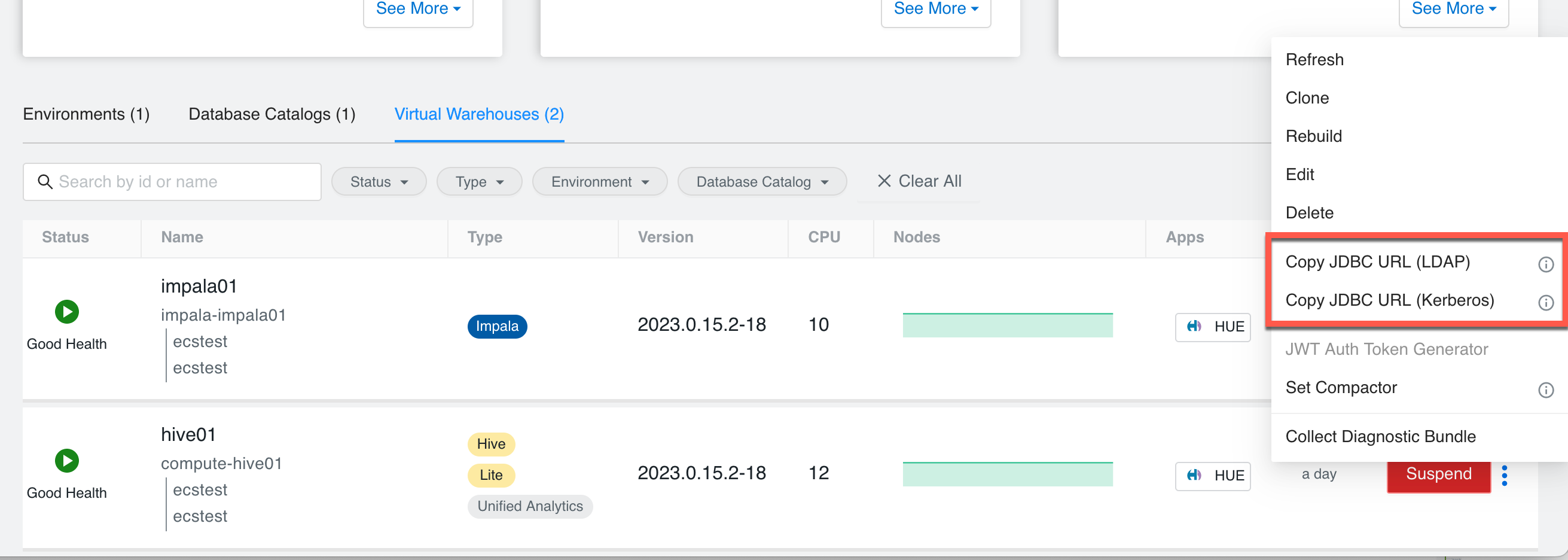
- Impala(CDW)
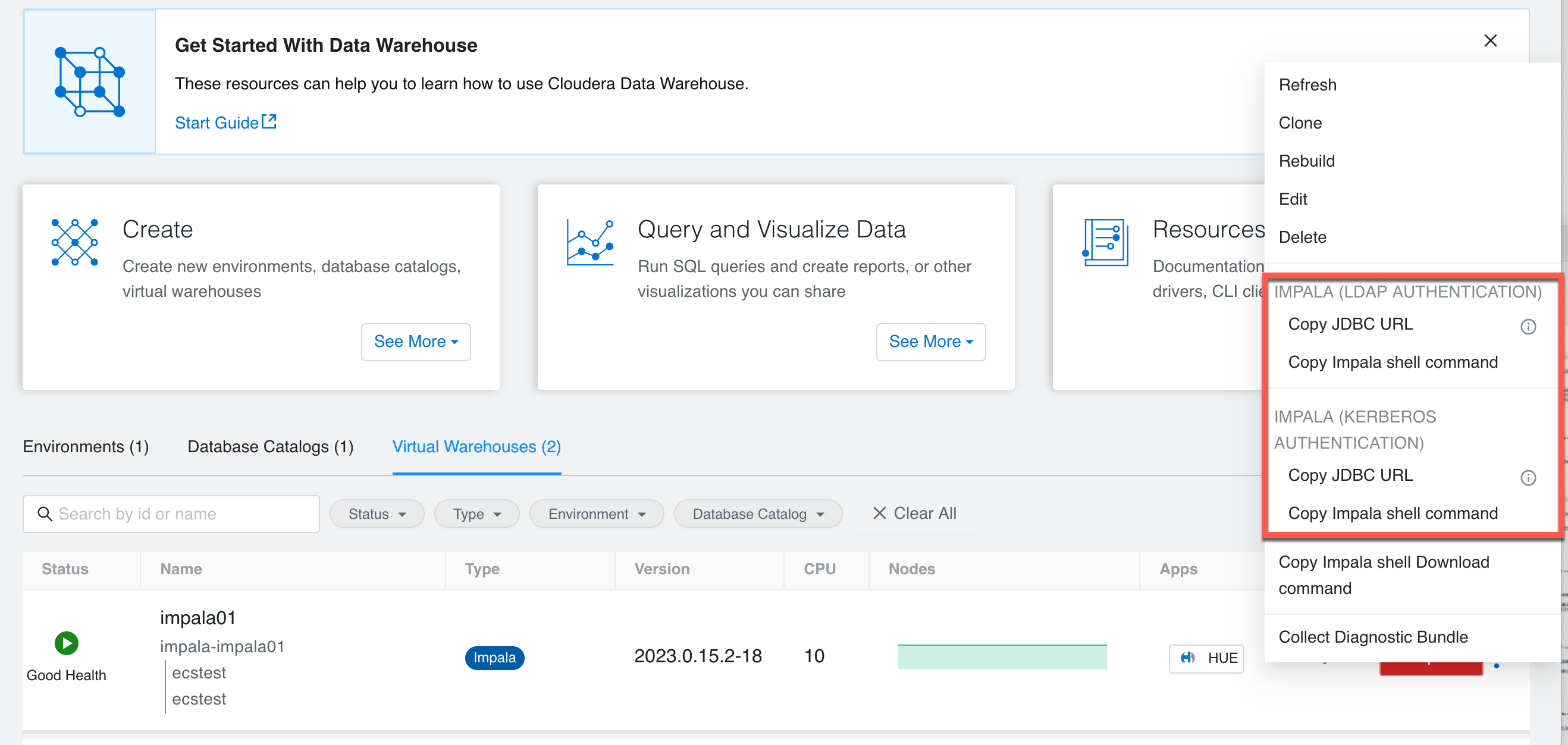
- Unified Analytics(CDW)
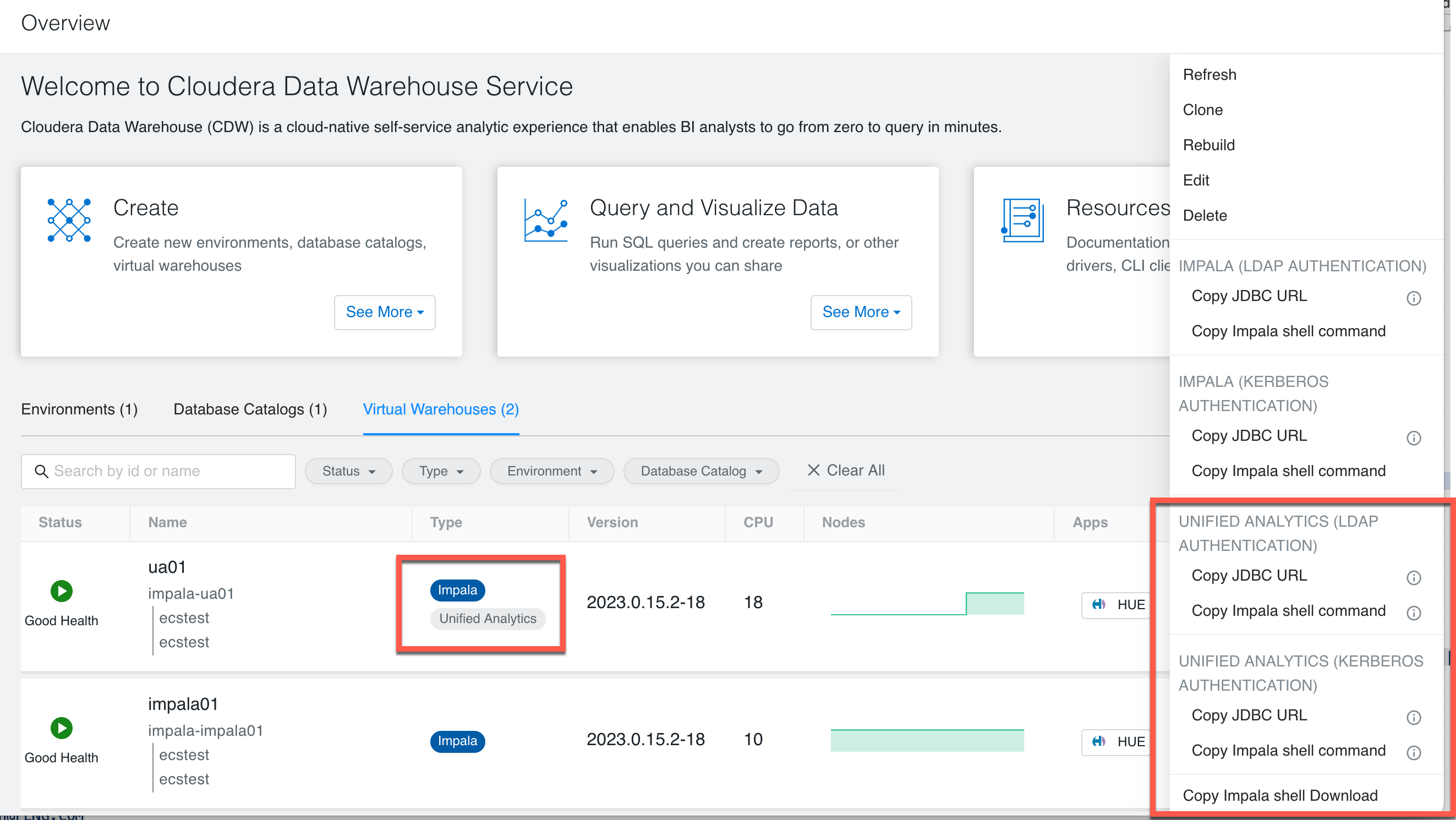
- Go to Hive Virtual Warehouse > more (…) and click
- How to get
sslTrustStoreandtrustStorePasswordfor the JDBC URL?- For Auto-TLS enabled Base cluster, please download
sslTrustStorefrom the location/var/lib/cloudera-scm-agent/agent-cert/cm-auto-in_cluster_truststore.jks. You can retrievetrustStorePasswordvia CM API. e.g.curl -k --insecure -u admin:password -X GET https://ccycloud-1.tiger.root.hwx.site:7183/api/v42/certs/truststorePassword - For Hive/Impala Virtual Warehouse, please retrieve
sslTrustStoreby a kubectl call:kubectl get configmap -n cdp vault-jks -o jsonpath="{.binaryData['truststore\.jks']}"| base64 --decode > truststore.jks. The defaulttrustStorePasswordischangeit.
- For Auto-TLS enabled Base cluster, please download
4.1 Case 01 - Hive on Tez(Base Cluster) + Kerberos auth
- Connect to Hive in CDP Base cluster[realm=FENG.COM] using Kerberos authentication.
- Note: You must set
JAVA_TOOL_OPTIONS=-Djavax.security.auth.useSubjectCredsOnly=falseproperty in the java env which allows jvm to use kerberos tickets from the system ticket cache.
- Note: You must set
kinit admin@FENG.COM
JAVA_TOOL_OPTIONS="-Djavax.security.auth.useSubjectCredsOnly=false" beeline -u 'jdbc:hive2://ccycloud-1.tiger.root.hwx.site:10000/default;principal=hive/_HOST@FENG.COM;ssl=true;sslTrustStore=./cm-auto-in_cluster_truststore.jks'
select logged_in_user();
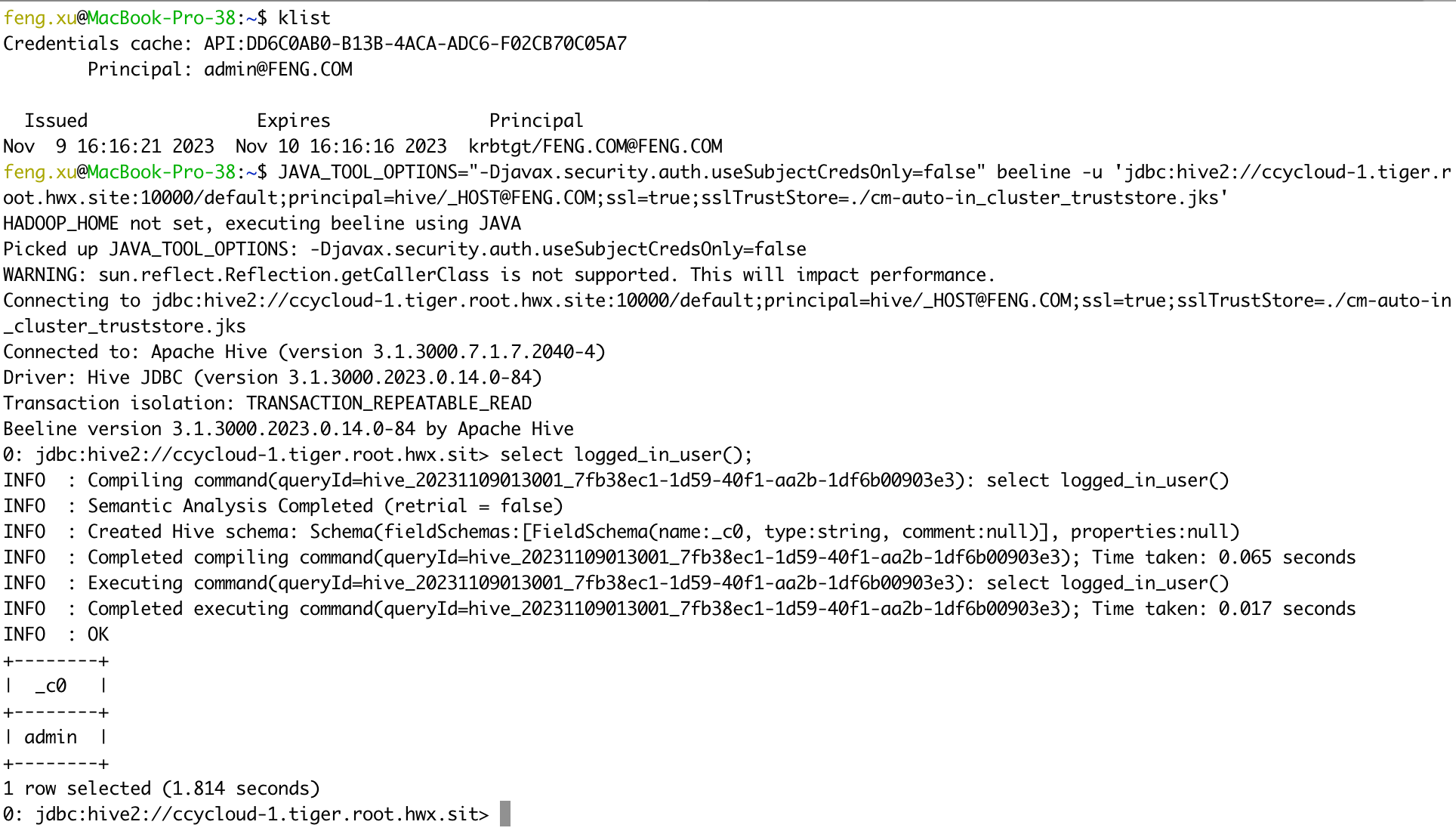
4.2 Case 02 - Hive on Tez(Base Cluster) + LDAP auth
- Connect to Hive in CDP Base cluster[realm=FENG.COM] using LDAP authentication.
beeline -u 'jdbc:hive2://ccycloud-1.tiger.root.hwx.site:10000/default;ssl=true;sslTrustStore=./cm-auto-in_cluster_truststore.jks' -n cdw01 -p
select logged_in_user();
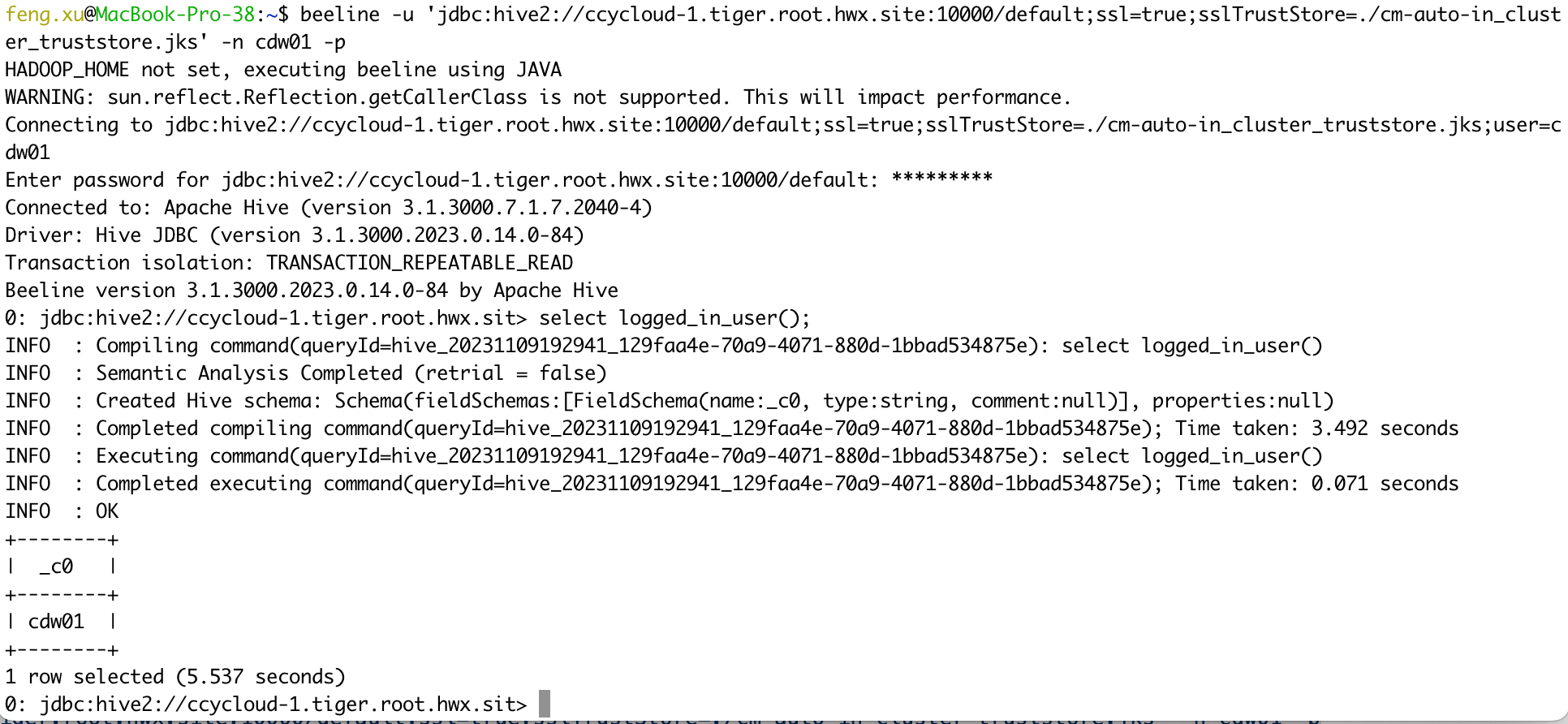
4.3 Case 03 - Hive LLAP(CDW) + Kerberos auth
Connect to Hive VW in PvC CDW using Kerberos authentication.
1) ssl=false
kinit admin
JAVA_TOOL_OPTIONS="-Djavax.security.auth.useSubjectCredsOnly=false" beeline -u "jdbc:hive2://hs2-hive01.apps.ecstest.sme-feng.athens.cloudera.com/default;transportMode=http;httpPath=cliservice;socketTimeout=60;ssl=false;retries=3;kerberosEnableCanonicalHostnameCheck=false;principal=hive/dwx-env-ecstest.cdp.local@FENG.COM"
select logged_in_user();
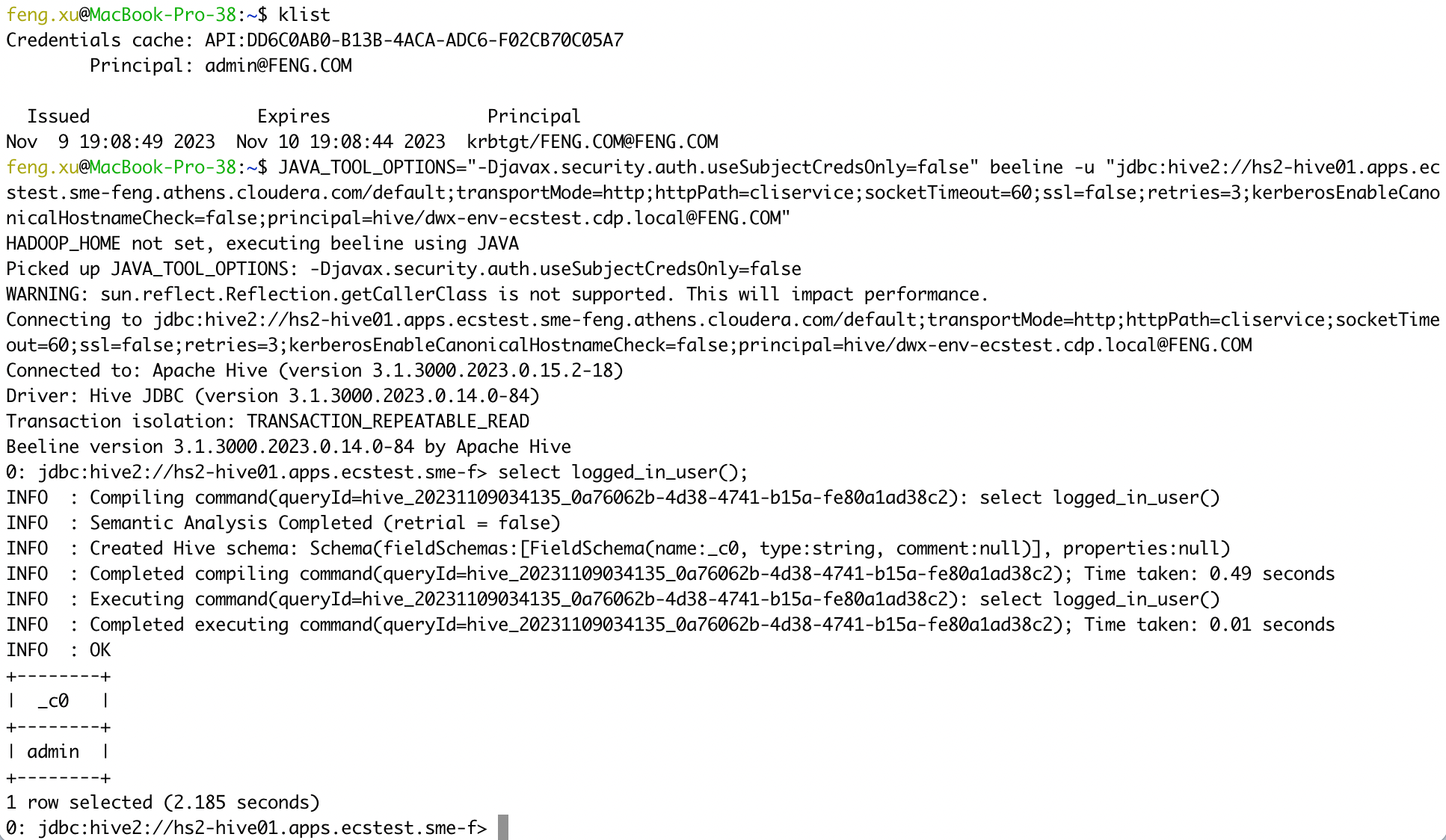
- 2) ssl=true
kubectl get configmap -n cdp vault-jks -o jsonpath="{.binaryData['truststore\.jks']}"| base64 --decode > truststore.jks
kinit admin
JAVA_TOOL_OPTIONS="-Djavax.security.auth.useSubjectCredsOnly=false" beeline -u "jdbc:hive2://hs2-hive01.apps.ecstest.sme-feng.athens.cloudera.com/default;transportMode=http;httpPath=cliservice;socketTimeout=60;ssl=true;sslTrustStore=truststore.jks;trustStorePassword=changeit;retries=3;kerberosEnableCanonicalHostnameCheck=false;principal=hive/dwx-env-ecstest.cdp.local@FENG.COM"
select logged_in_user();
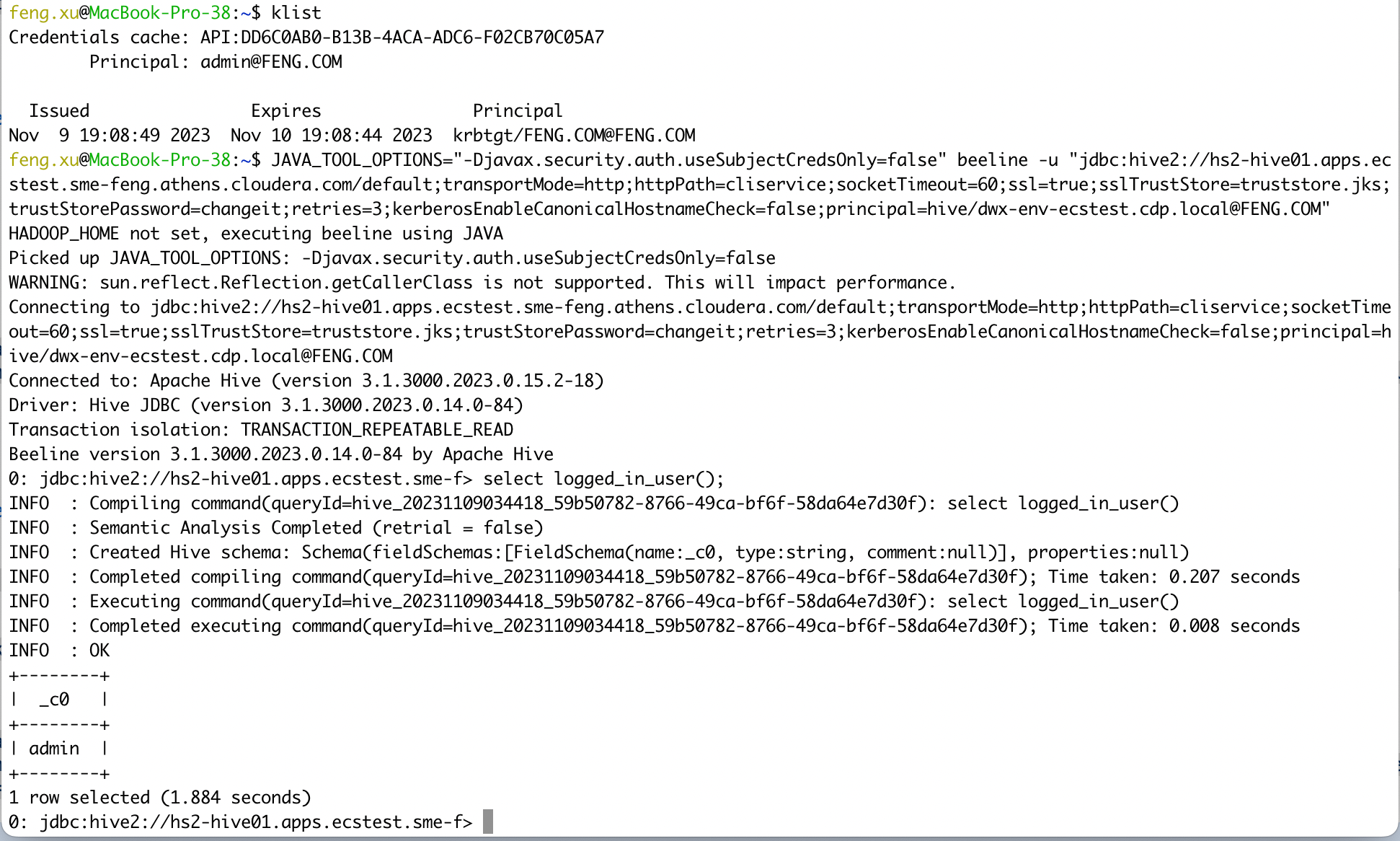
4.4 Case 04 - Hive LLAP(CDW) + LDAP auth
Connect to Hive VW in PvC CDW using LDAP authentication.
1) ssl=false
beeline -u 'jdbc:hive2://hs2-hive01.apps.ecstest.sme-feng.athens.cloudera.com/default;transportMode=http;httpPath=cliservice;ssl=false;retries=3' -n cdw01 -p
select logged_in_user();
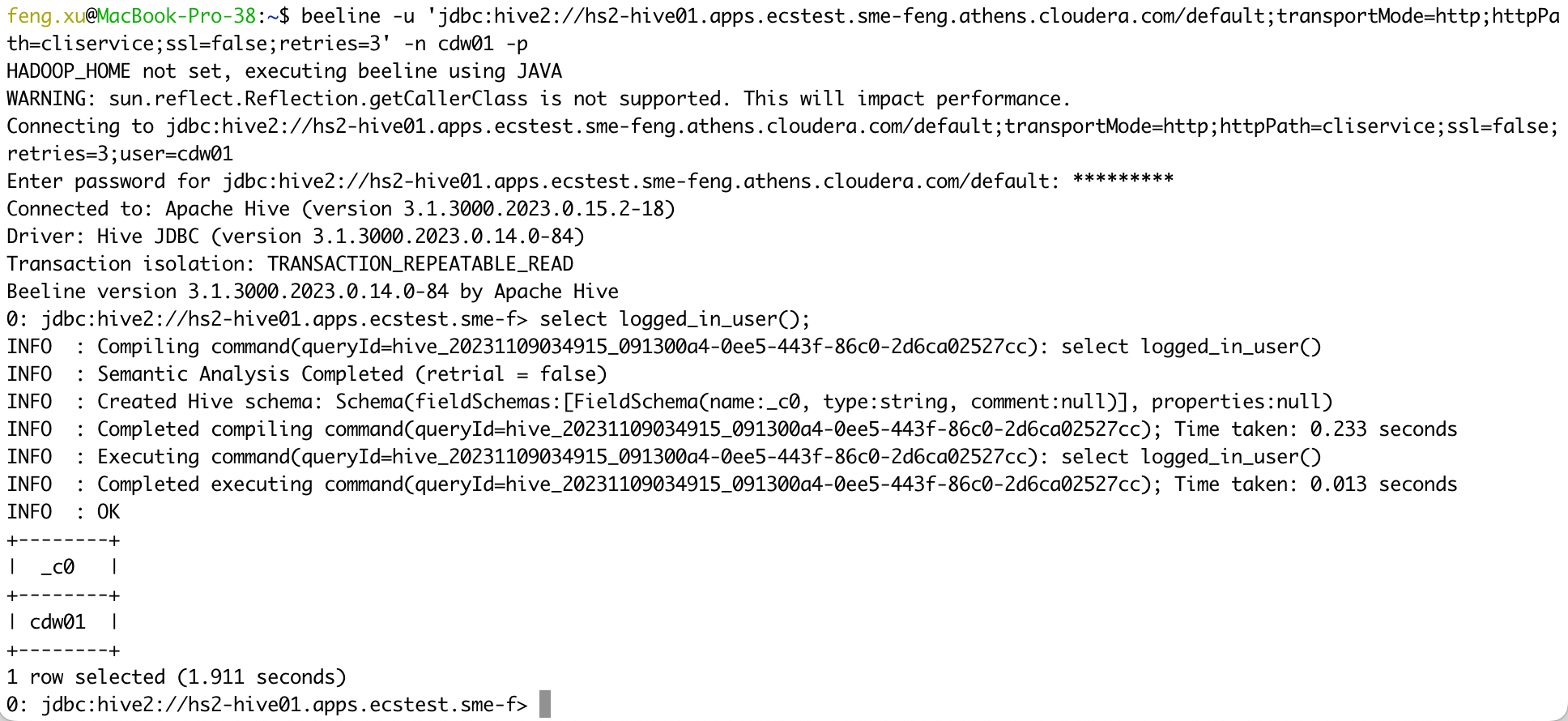
- 2) ssl=true
kubectl get configmap -n cdp vault-jks -o jsonpath="{.binaryData['truststore\.jks']}"| base64 --decode > truststore.jks
beeline -u 'jdbc:hive2://hs2-hive01.apps.ecstest.sme-feng.athens.cloudera.com/default;transportMode=http;httpPath=cliservice;ssl=true;sslTrustStore=./truststore.jks;trustStorePassword=changeit;retries=3' -n cdw01 -p
select logged_in_user();
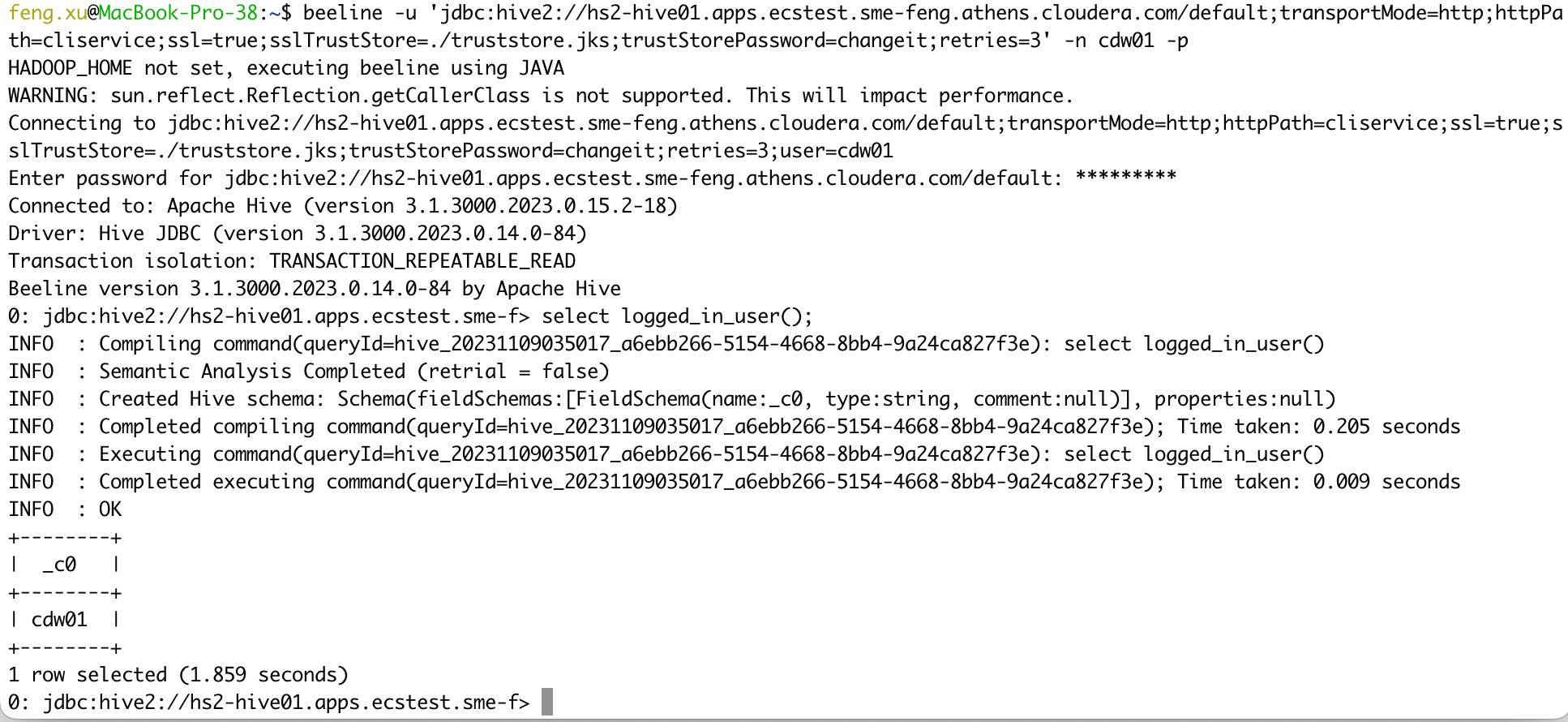
4.5 Case 05 - Impala(Base Cluster) + Kerberos auth
- Connect to Impala in CDP Base cluster B [realm=FENG.COM] using Kerberos authentication.
kinit admin@FENG.COM
export HIVE_AUX_JARS_PATH=$HOME/hadoop-clients/drivers/ImpalaJDBC42.jar
beeline -d 'com.cloudera.impala.jdbc42.Driver' -u 'jdbc:impala://ccycloud-3.tiger.root.hwx.site:21050;AuthMech=1;KrbHostFQDN=ccycloud-3.tiger.root.hwx.site;KrbServiceName=impala;SSL=1;sslTrustStore=./cm-auto-in_cluster_truststore.jks'
select logged_in_user();
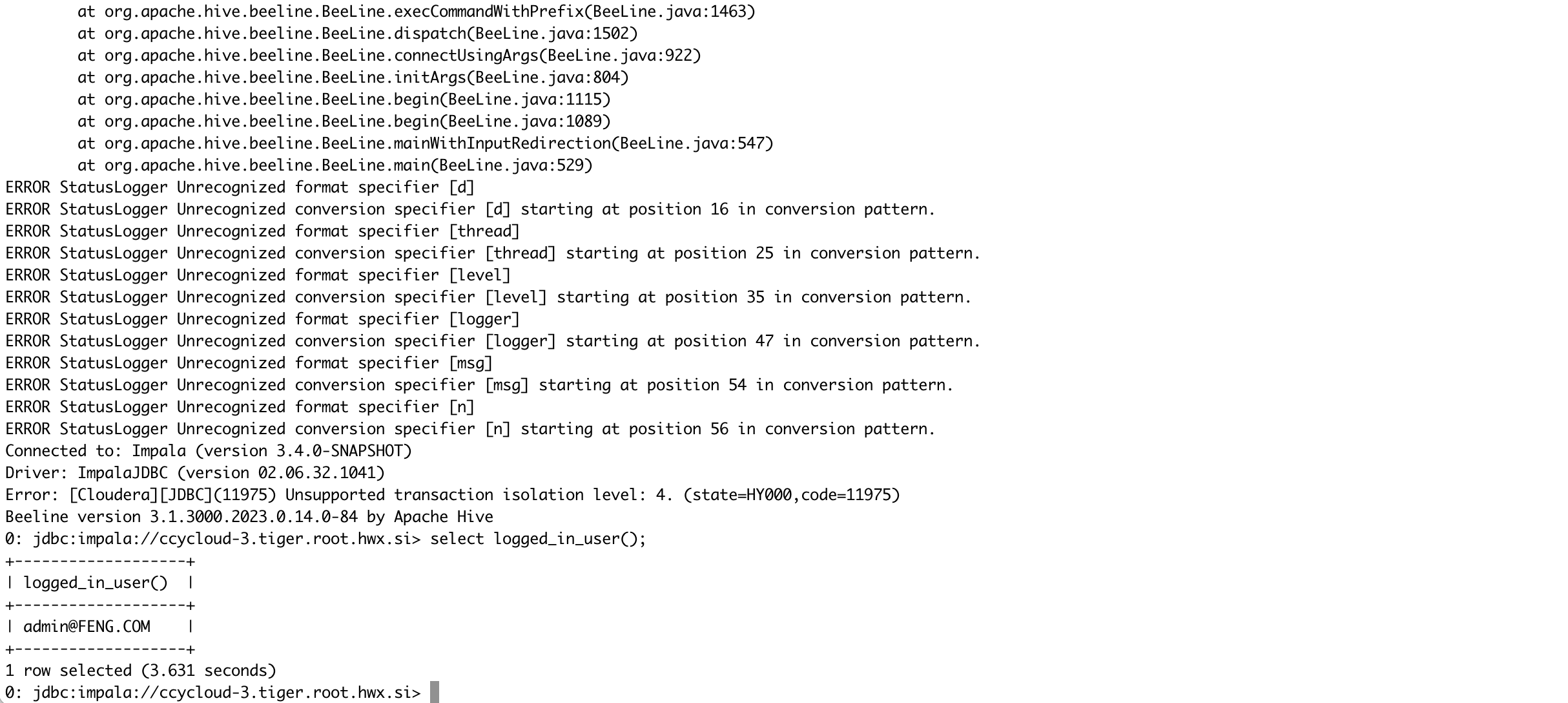
4.6 Case 06 - Impala(Base Cluster) + LDAP auth
- Connect to Impala in CDP Base cluster B [realm=FENG.COM] using LDAP authentication.
export HIVE_AUX_JARS_PATH=$HOME/hadoop-clients/drivers/ImpalaJDBC42.jar
beeline -d 'com.cloudera.impala.jdbc.Driver' -u 'jdbc:impala://ccycloud-3.tiger.root.hwx.site:21050;AuthMech=3;SSL=1;sslTrustStore=./cm-auto-in_cluster_truststore.jks' -n cdw01 -p
select logged_in_user();
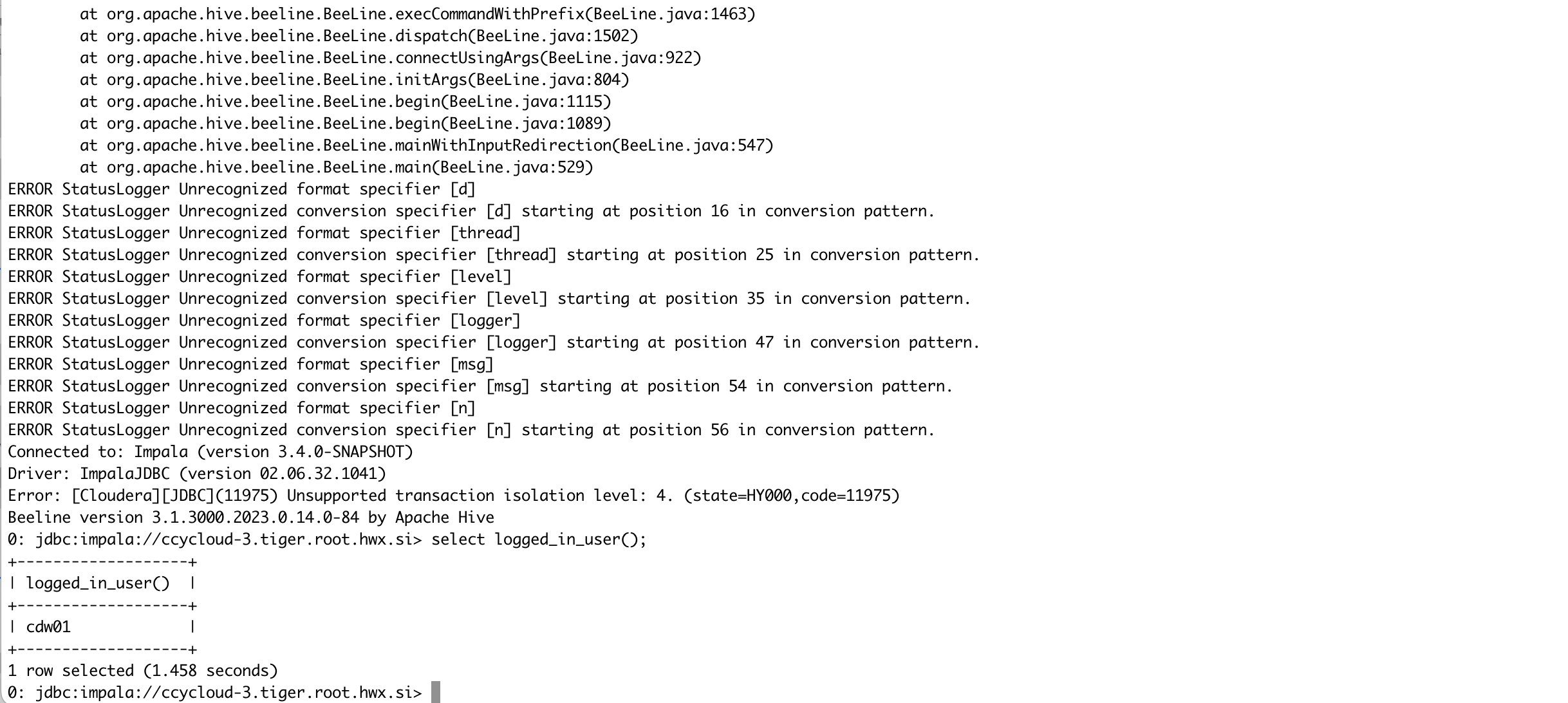
4.7 Case 07 - Impala(CDW) + Kerberos auth
- Connect to Impala VW in PvC CDW using Kerberos authentication.
kubectl get configmap -n cdp vault-jks -o jsonpath="{.binaryData['truststore\.jks']}"| base64 --decode > truststore.jks
kinit admin
export HIVE_AUX_JARS_PATH=$HOME/hadoop-clients/drivers/ImpalaJDBC42.jar
beeline -u "jdbc:impala://coordinator-impala01.apps.ecstest.sme-feng.athens.cloudera.com:443/default;AuthMech=1;transportMode=http;httpPath=cliservice;ssl=1;KrbHostFQDN=dwx-env-ecstest.cdp.local.;KrbServiceName=hive;sslTrustStore=truststore.jks;trustStorePassword=changeit"
select logged_in_user();

4.8 Case 08 - Impala(CDW) + LDAP auth
- Connect to Impala VW in PvC CDW using LDAP authentication.
kubectl get configmap -n cdp vault-jks -o jsonpath="{.binaryData['truststore\.jks']}"| base64 --decode > truststore.jks
export HIVE_AUX_JARS_PATH=$HOME/hadoop-clients/drivers/ImpalaJDBC42.jar
beeline -u "jdbc:impala://coordinator-impala01.apps.ecstest.sme-feng.athens.cloudera.com:443/default;AuthMech=3;transportMode=http;httpPath=cliservice;ssl=1;sslTrustStore=truststore.jks;trustStorePassword=changeit" -n cdw01 -p
select logged_in_user();

4.9 Case 09 - Unified Analytics(CDW) + Kerberos auth
Connect to Unified Analytics VW in PvC CDW using Kerberos authentication.
1) ssl=false
kinit admin
JAVA_TOOL_OPTIONS="-Djavax.security.auth.useSubjectCredsOnly=false" beeline -u "jdbc:hive2://hs2-ua01.apps.ecstest.sme-feng.athens.cloudera.com/default;transportMode=http;httpPath=cliservice;ssl=false;retries=3;kerberosEnableCanonicalHostnameCheck=false;principal=hive/dwx-env-ecstest.cdp.local@FENG.COM"
select logged_in_user();
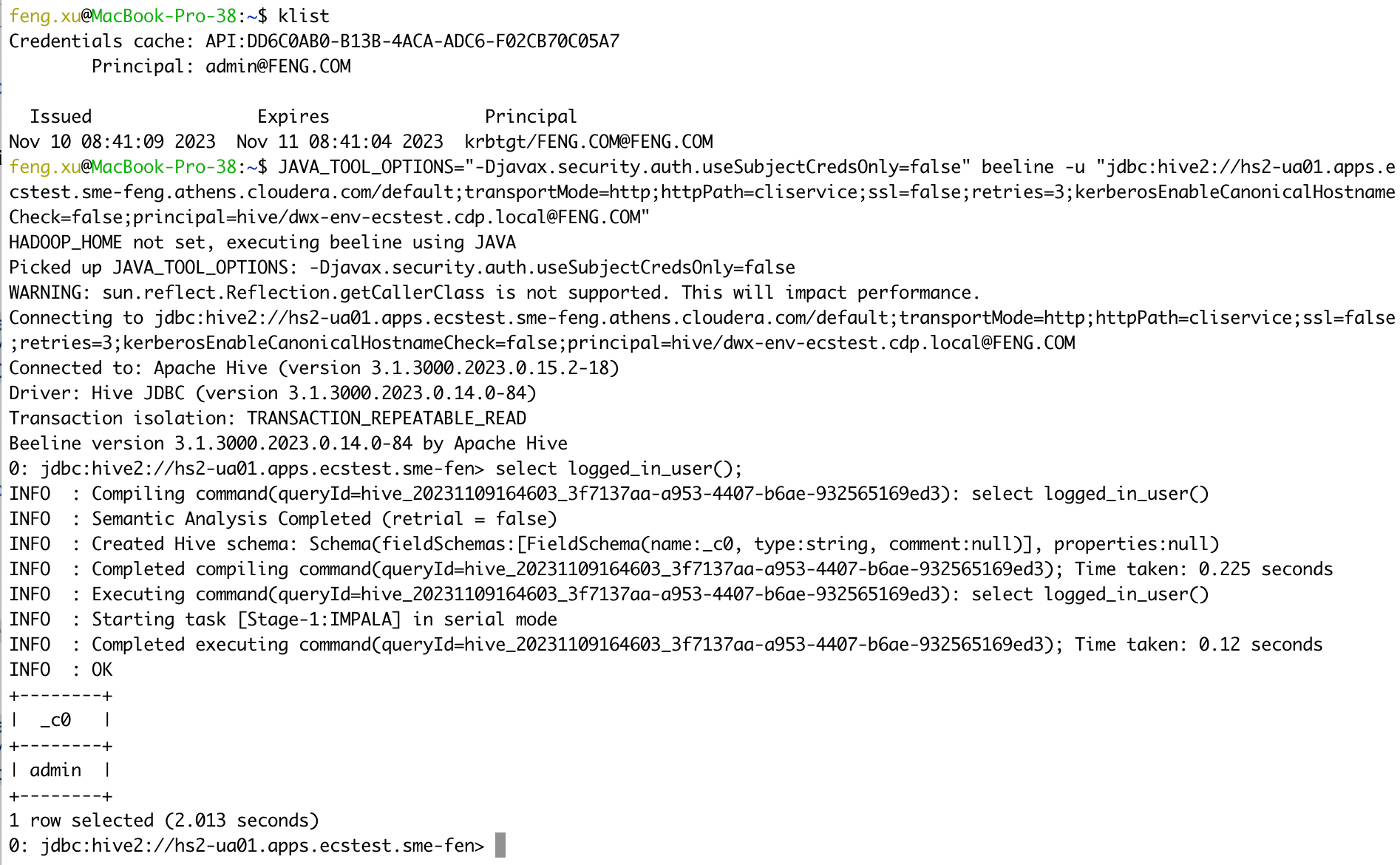
- 2) ssl=true
kubectl get configmap -n cdp vault-jks -o jsonpath="{.binaryData['truststore\.jks']}"| base64 --decode > truststore.jks
kinit admin
JAVA_TOOL_OPTIONS="-Djavax.security.auth.useSubjectCredsOnly=false" beeline -u "jdbc:hive2://hs2-ua01.apps.ecstest.sme-feng.athens.cloudera.com/default;transportMode=http;httpPath=cliservice;ssl=true;sslTrustStore=truststore.jks;trustStorePassword=changeit;retries=3;kerberosEnableCanonicalHostnameCheck=false;principal=hive/dwx-env-ecstest.cdp.local@FENG.COM"
select logged_in_user();
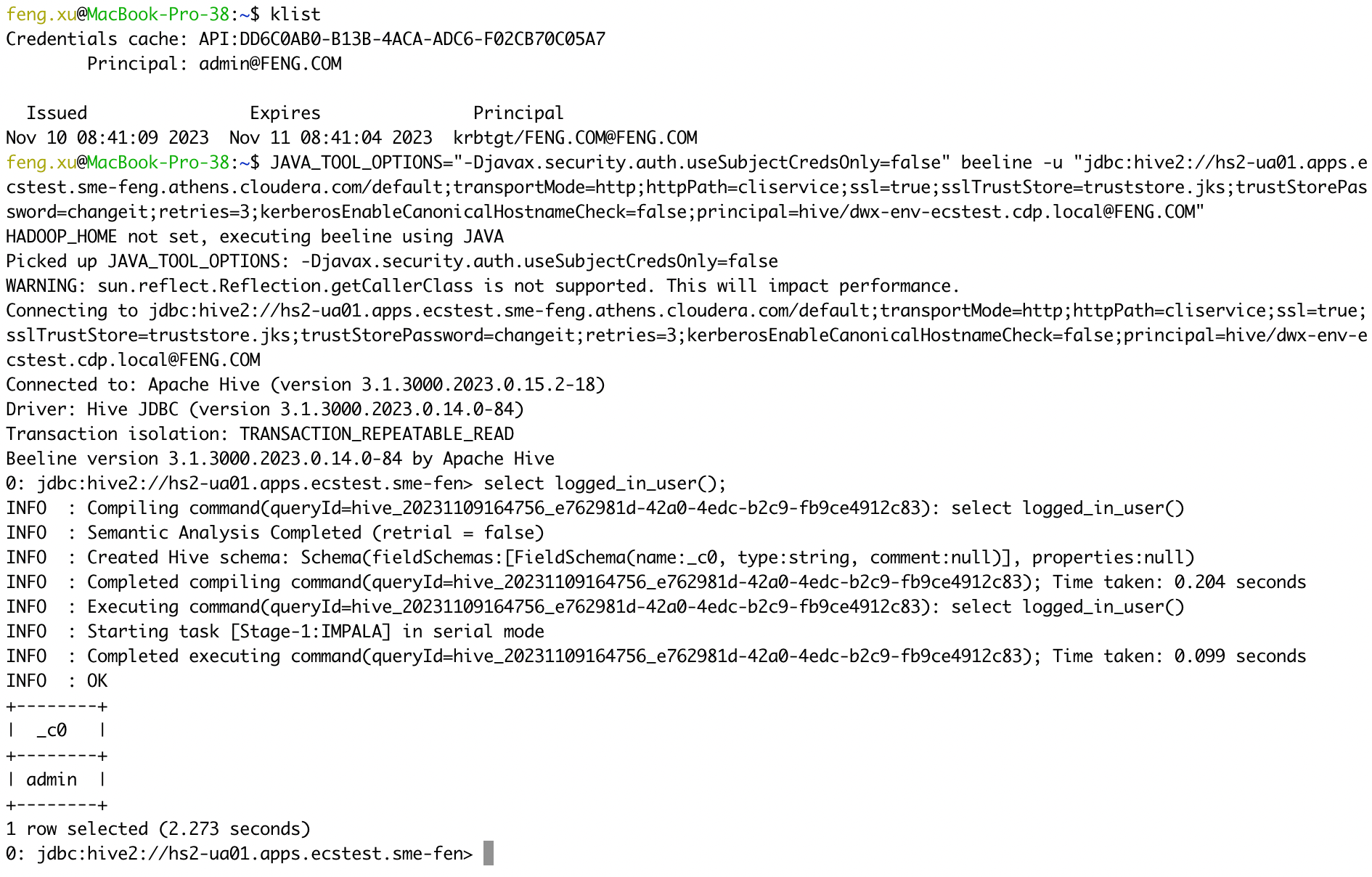
4.10 Case 10 - Unified Analytics(CDW) + LDAP auth
Connect to Unified Analytics VW in PvC CDW using LDAP authentication.
1) ssl=false
beeline -u 'jdbc:hive2://hs2-ua01.apps.ecstest.sme-feng.athens.cloudera.com/default;transportMode=http;httpPath=cliservice;ssl=false;retries=3' -n cdw01 -p
select logged_in_user();
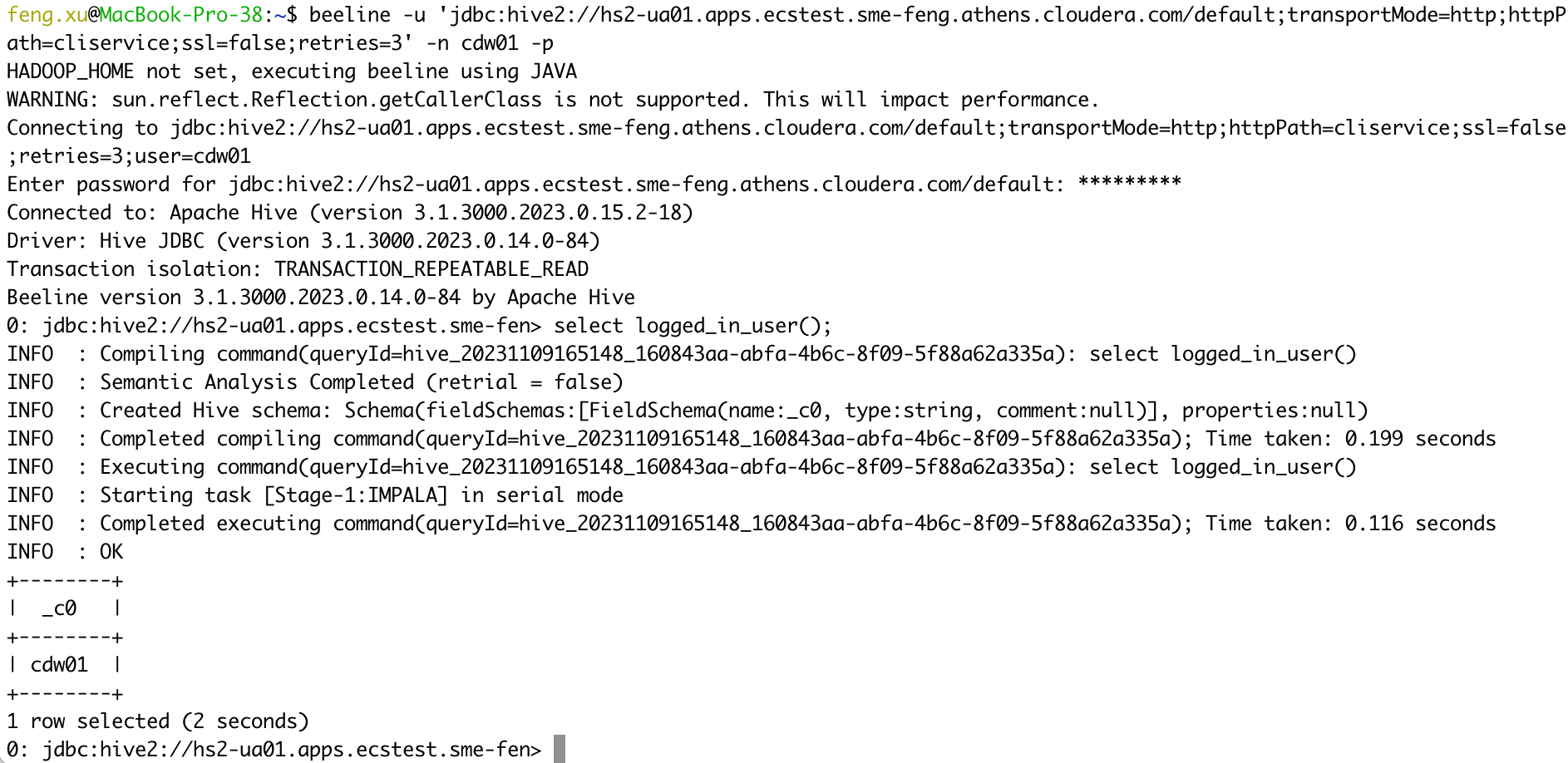
- 2) ssl=true
kubectl get configmap -n cdp vault-jks -o jsonpath="{.binaryData['truststore\.jks']}"| base64 --decode > truststore.jks
beeline -u 'jdbc:hive2://hs2-ua01.apps.ecstest.sme-feng.athens.cloudera.com/default;transportMode=http;httpPath=cliservice;ssl=true;sslTrustStore=truststore.jks;trustStorePassword=changeit;retries=3' -n cdw01 -p
select logged_in_user();
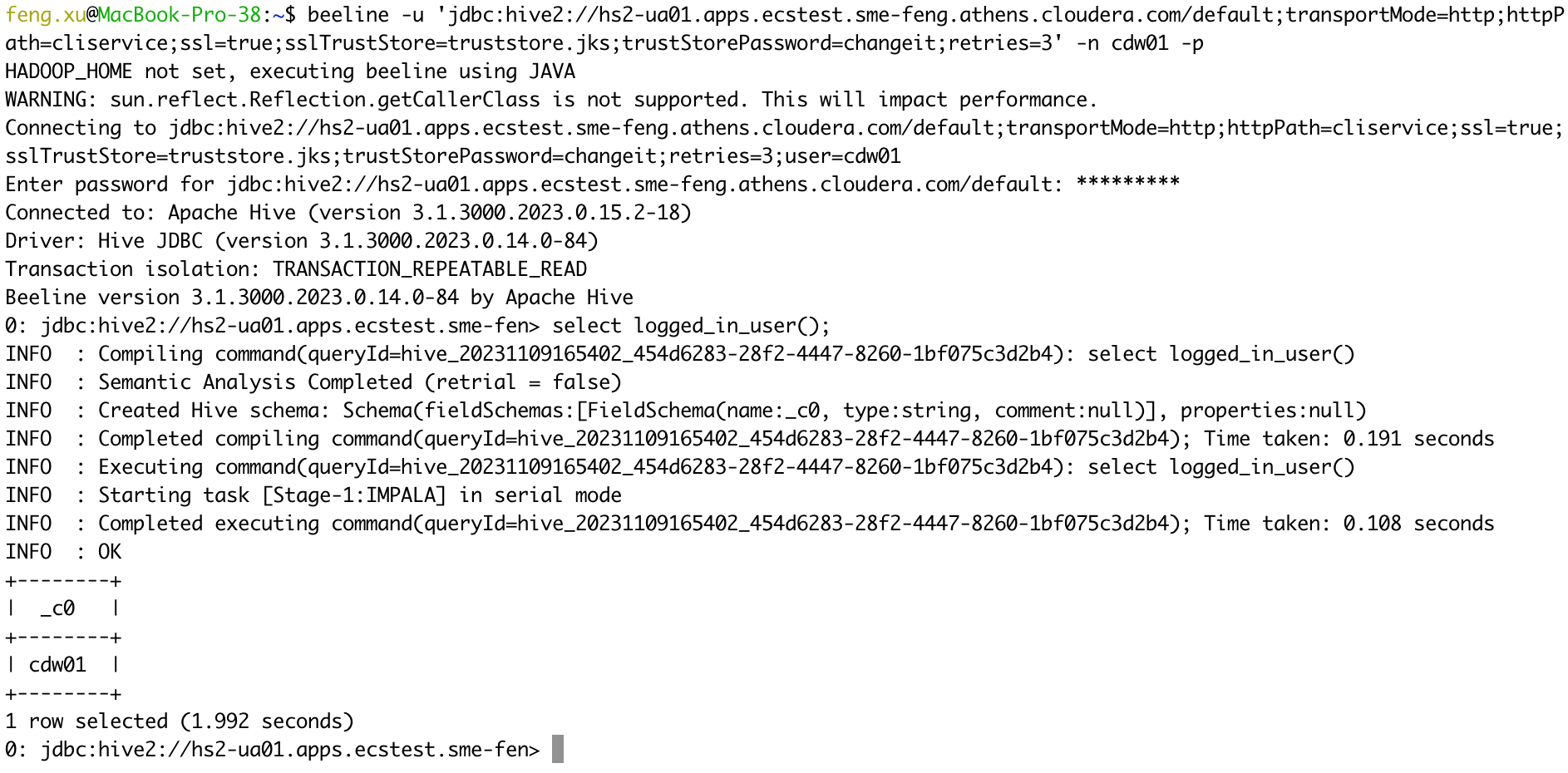
5. Validate impala-shell
| Test Cases | Connect To | Authentication Type | Status |
| Case 11 | Impala(Base Cluster) | Kerberos | Successful |
| Case 12 | Impala(Base Cluster) | LDAP | Successful |
| Case 13 | Impala(CDW) | Kerberos | Successful |
| Case 14 | Impala(CDW) | LDAP | Successful |
| Case 15 | Unified Analytics(CDW) | Kerberos | Successful |
| Case 16 | Unified Analytics(CDW) | LDAP | Successful |
Please upgrade impala-shell to 4.4.0a1 or later.
You can enable kerberos debug logging for impala-shell.
export HADOOP_OPTS="-Dsun.security.krb5.debug=true"
export KRB5_TRACE=/dev/stdout
export HADOOP_ROOT_LOGGER=TRACE,console
- How to get the Impala shell command?
- Go to Impala Virtual Warehouse > more (…) and click
Copy Impala shell command.
- Go to Impala Virtual Warehouse > more (…) and click
- How to get
ca_certfor the JDBC URL?- For Auto-TLS enabled Base cluster, please download
ca_certfrom the location/var/lib/cloudera-scm-agent/agent-cert/cm-auto-in_cluster_ca_cert.pem. - For Impala Virtual Warehouse, please retrieve
ca_certby a kubectl call:kubectl get secret -n vault-system vault-server-tls -o jsonpath="{.data['vault\.ca']}"| base64 --decode > vault.ca.
- For Auto-TLS enabled Base cluster, please download
5.1 Case 11 - Impala(Base Cluster) + Kerberos auth
Connect to Impala in CDP Base cluster using kerberos authentication.
1) NOT Verify Impala server certificates
kinit admin@FENG.COM
impala-shell --ssl -k -i ccycloud-3.tiger.root.hwx.site
select logged_in_user();
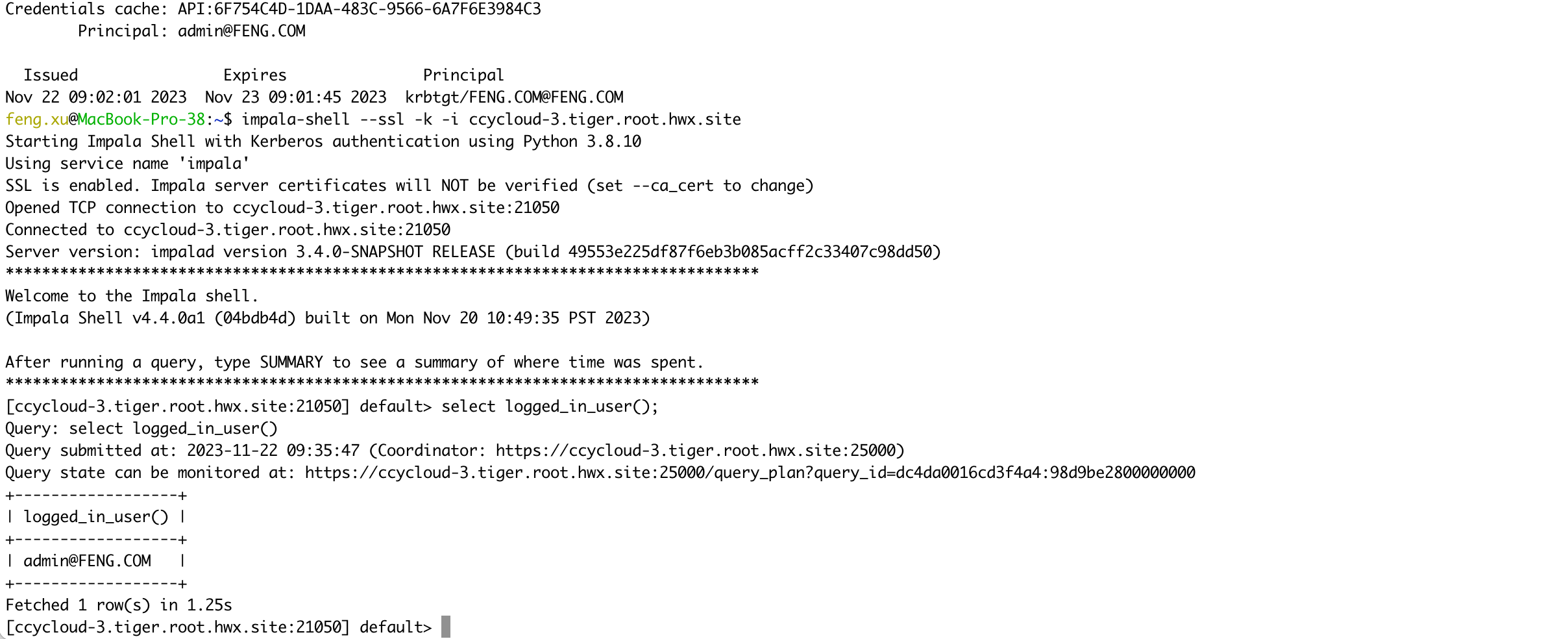
- 2) Verify Impala server certificates
kinit admin@FENG.COM
impala-shell --ssl -k -i ccycloud-3.tiger.root.hwx.site --ca_cert=./cm-auto-in_cluster_ca_cert.pem
select logged_in_user();
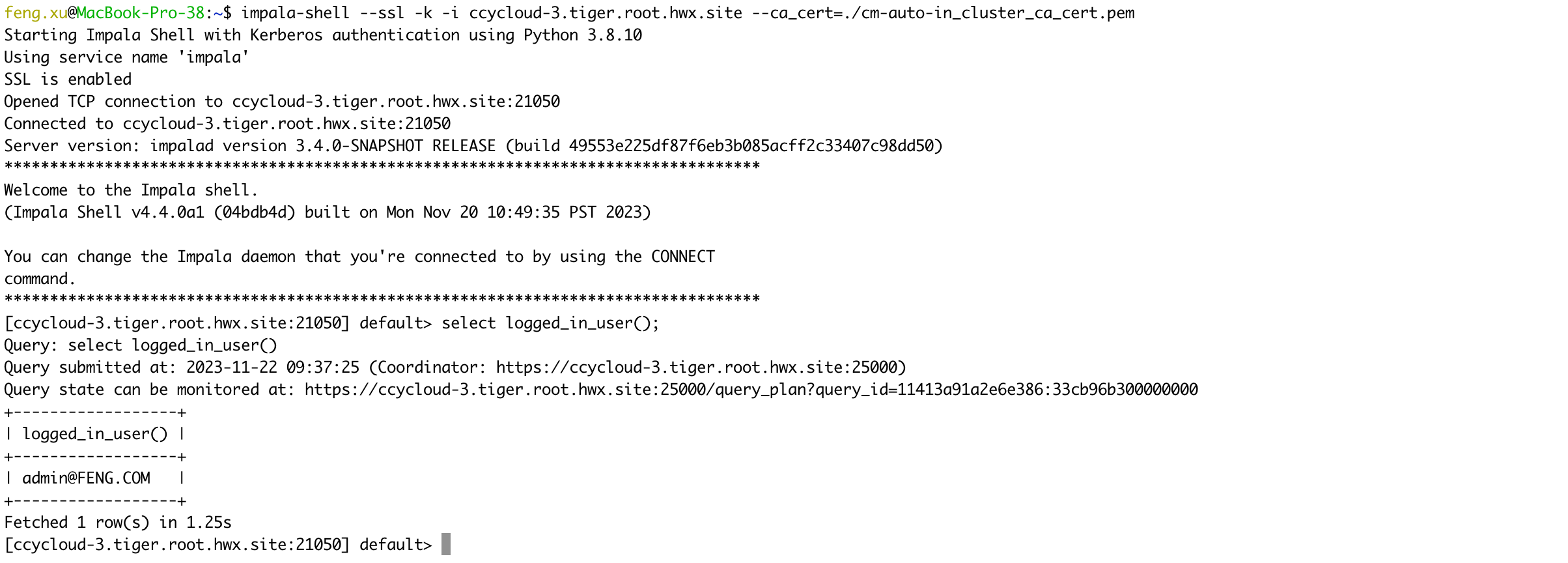
5.2 Case 12 - Impala(Base Cluster) + LDAP auth
Connect to Impala in CDP Base cluster using LDAP authentication.
1) NOT Verify Impala server certificates
impala-shell --ssl -i ccycloud-3.tiger.root.hwx.site -u cdw01 -l
select logged_in_user();
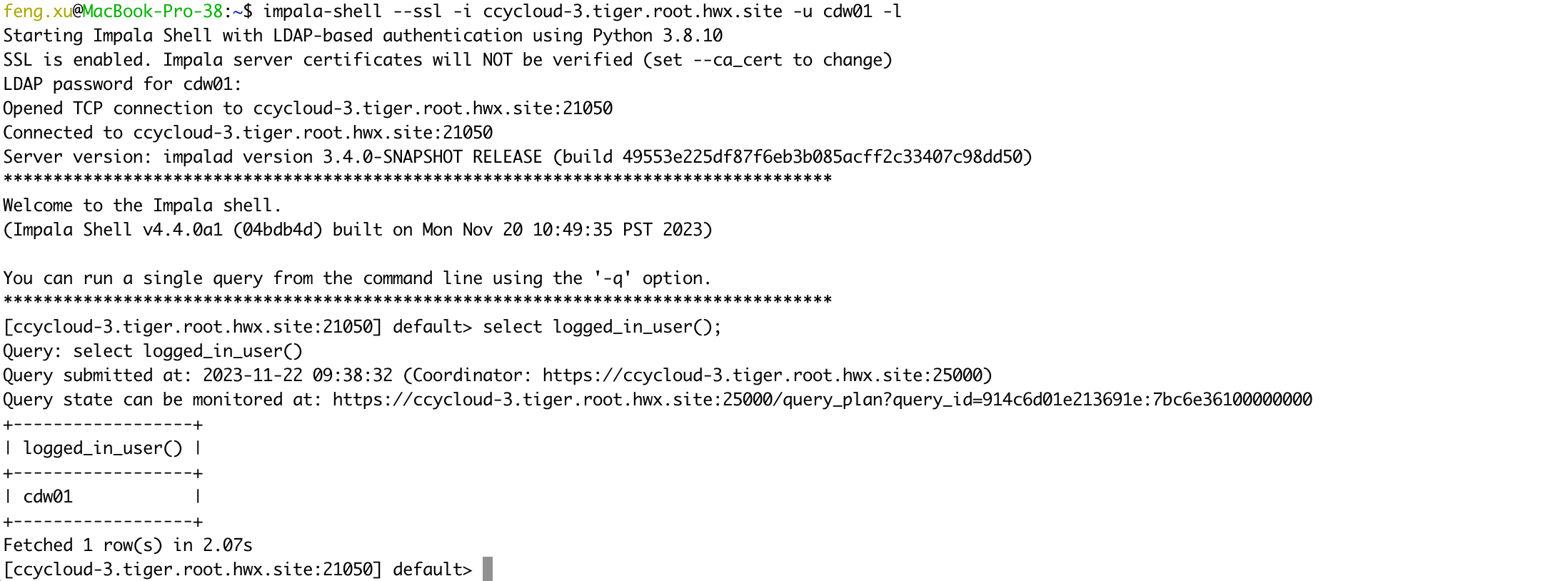
- 2) Verify Impala server certificates
impala-shell --ssl -i ccycloud-3.tiger.root.hwx.site -u cdw01 -l --ca_cert=./cm-auto-in_cluster_ca_cert.pem
select logged_in_user();
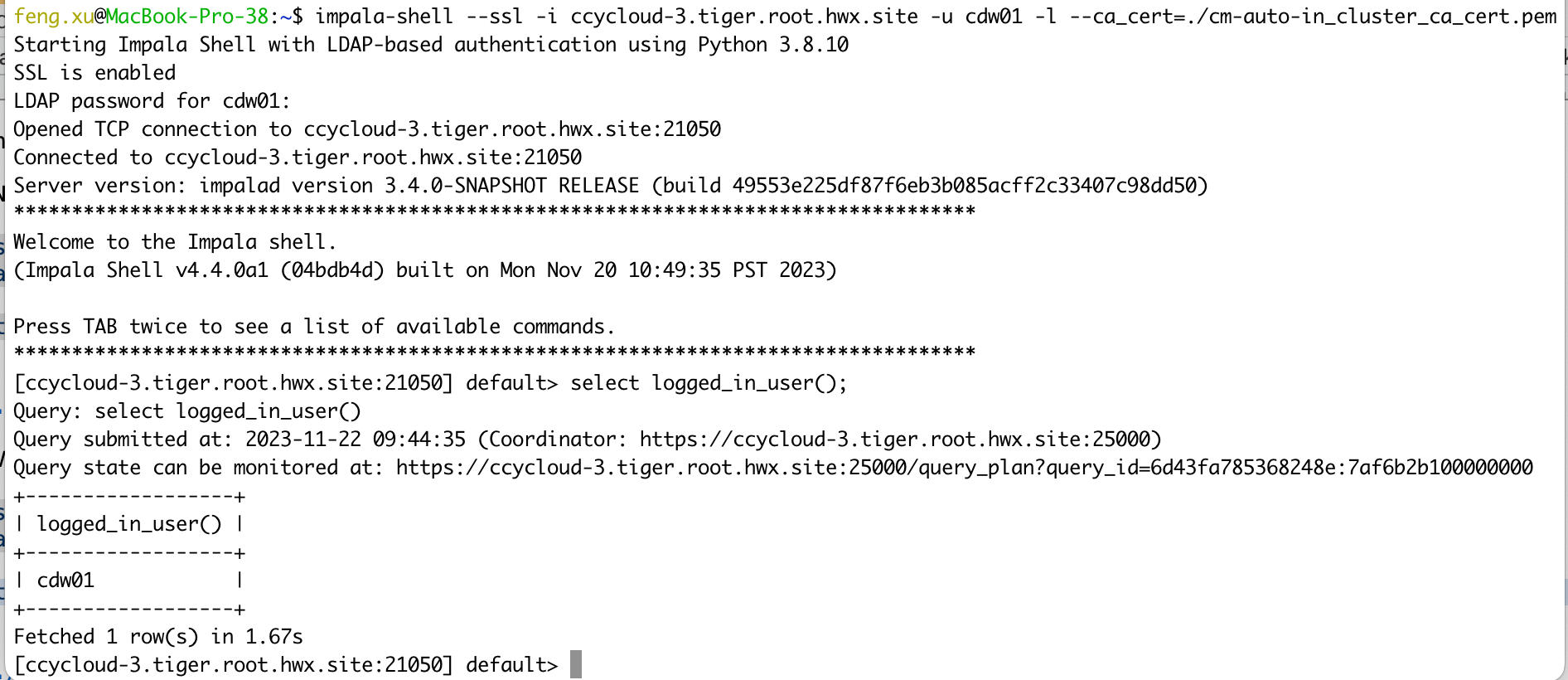
5.3 Case 13 - Impala(CDW) + Kerberos auth
Connect to Impala VW in PvC CDW using Kerberos authentication.
1) NOT Verify Impala server certificates
kinit admin
impala-shell --protocol='hs2-http' --ssl -i 'coordinator-impala01.apps.ecstest.sme-feng.athens.cloudera.com:443' -s hive -k -b dwx-env-ecstest.cdp.local.
select logged_in_user();
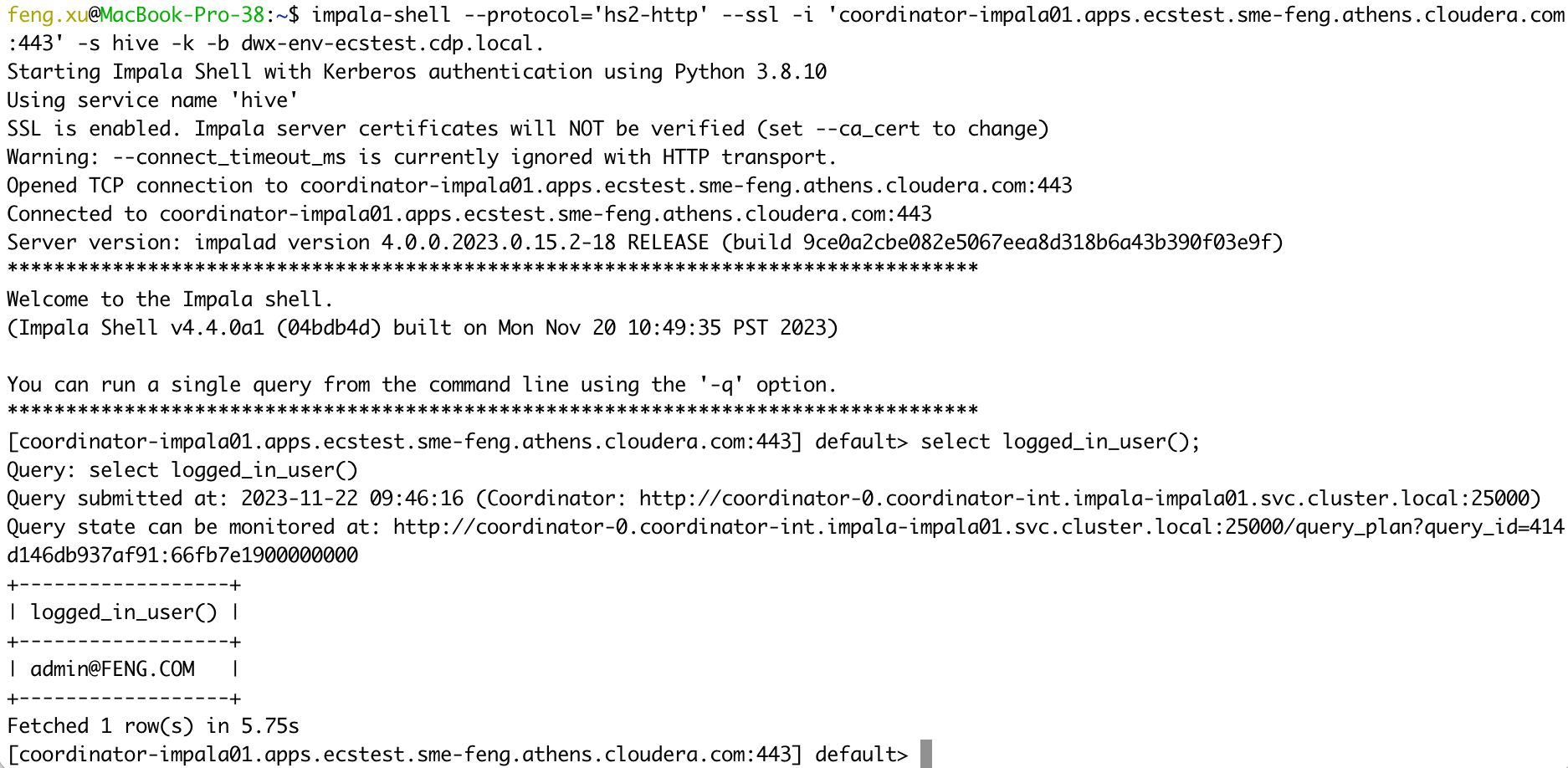
- 2) Verify Impala server certificates
kubectl get secret -n vault-system vault-server-tls -o jsonpath="{.data['vault\.ca']}"| base64 --decode > vault.ca
kinit admin
impala-shell --protocol='hs2-http' --ssl -i 'coordinator-impala01.apps.ecstest.sme-feng.athens.cloudera.com:443' -s hive -k -b dwx-env-ecstest.cdp.local. --ca_cert=./vault.ca
select logged_in_user();
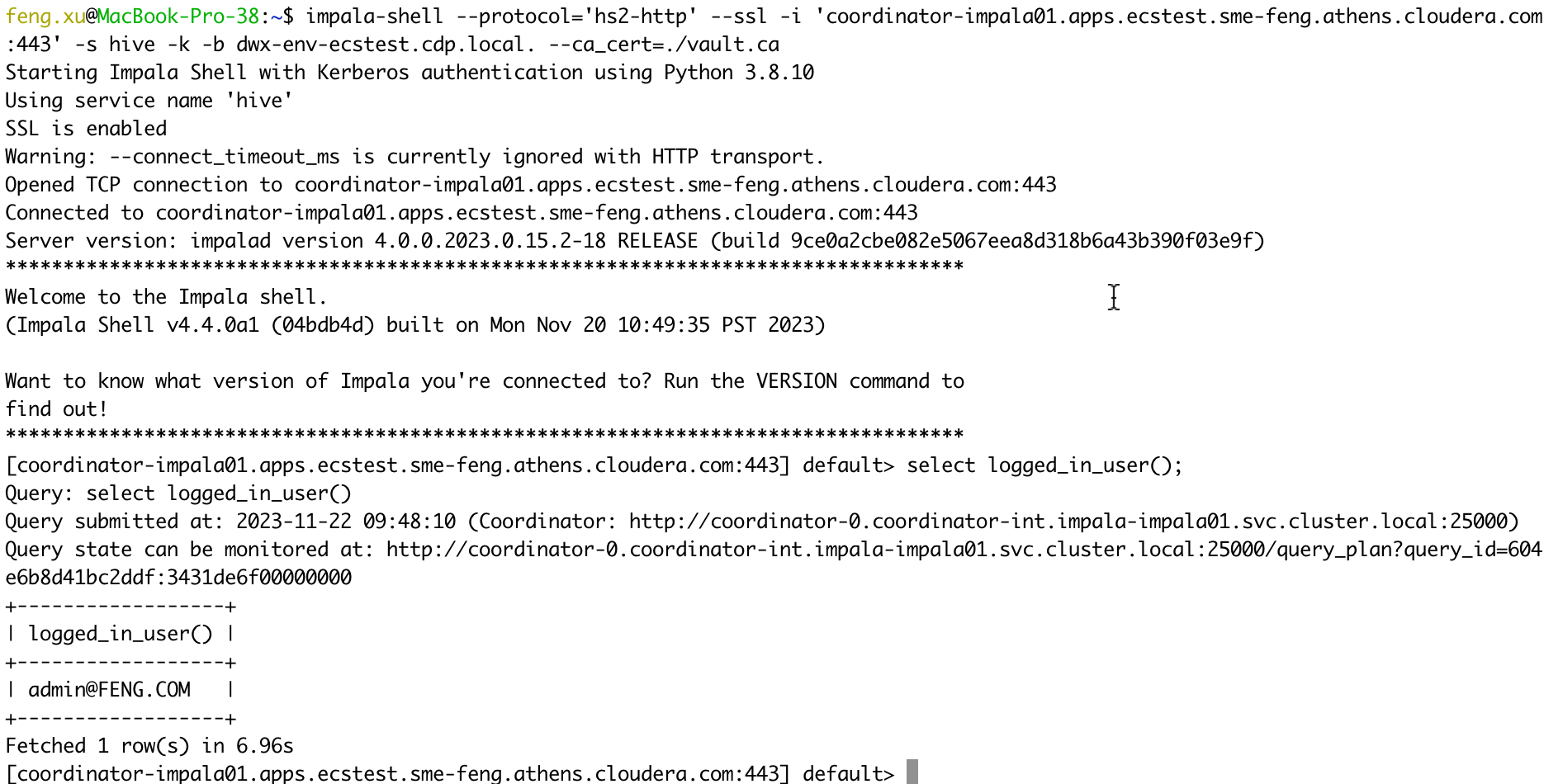
5.4 Case 14 - Impala(CDW) + LDAP auth
Connect to Impala VW in PvC CDW using LDAP authentication.
1) NOT Verify Impala server certificates
impala-shell --protocol='hs2-http' --ssl -i 'coordinator-impala01.apps.ecstest.sme-feng.athens.cloudera.com:443' -u cdw01 -l
select logged_in_user();
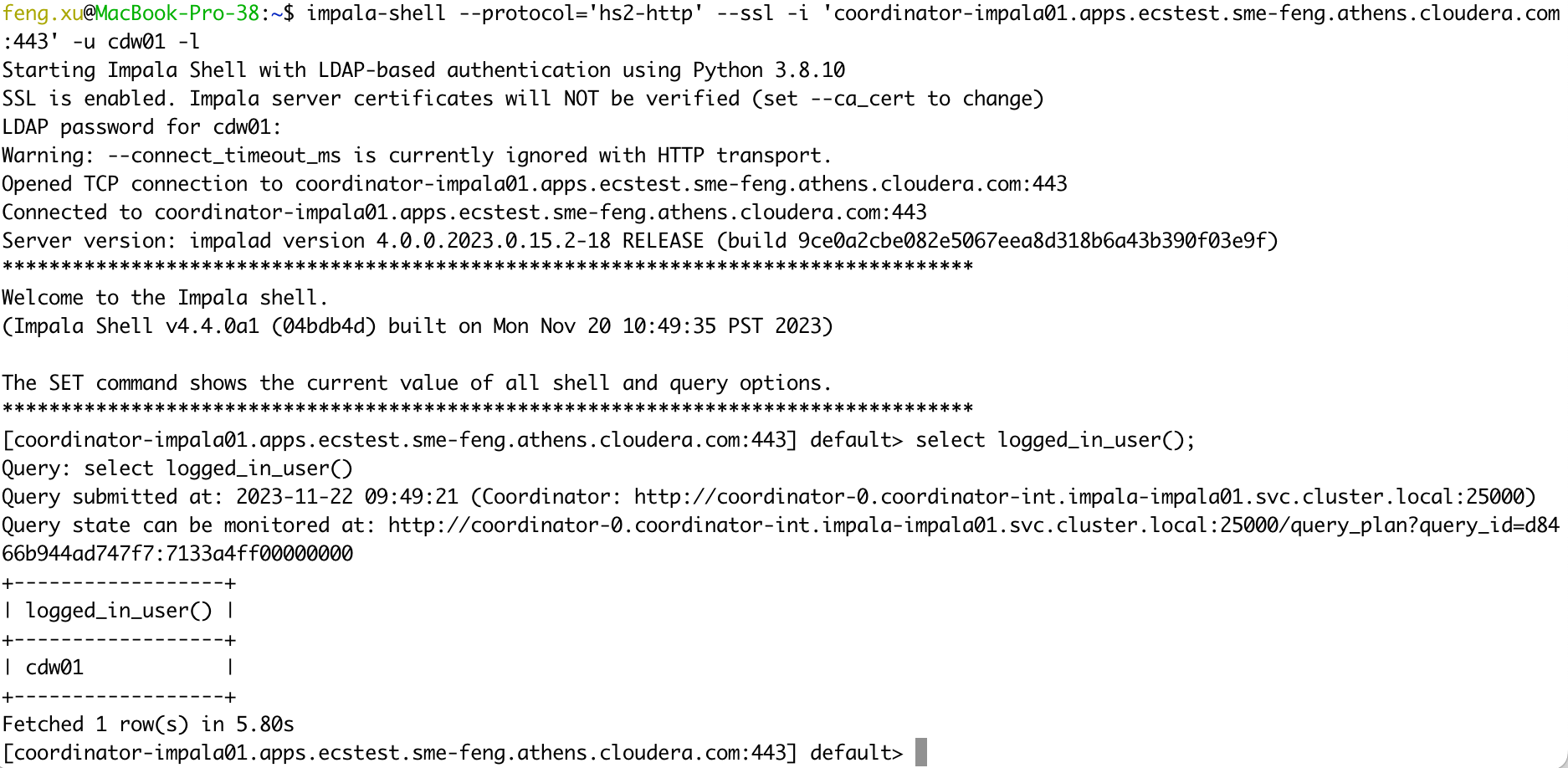
- 2) Verify Impala server certificates
kubectl get secret -n vault-system vault-server-tls -o jsonpath="{.data['vault\.ca']}"| base64 --decode > vault.ca
impala-shell --protocol='hs2-http' --ssl -i 'coordinator-impala01.apps.ecstest.sme-feng.athens.cloudera.com:443' -u cdw01 -l --ca_cert=./vault.ca
select logged_in_user();
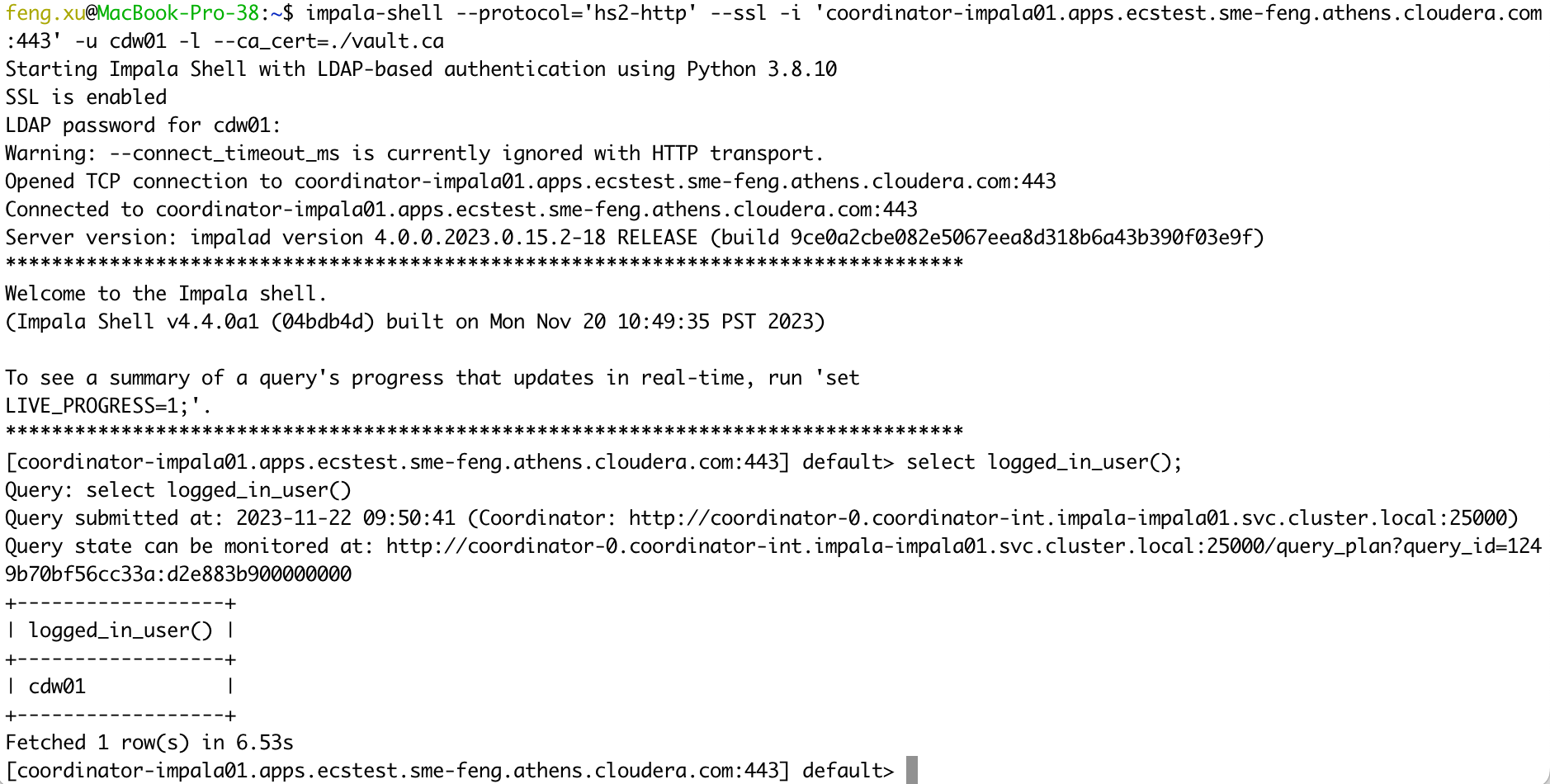
5.5 Case 15 - Unified Analytics(CDW) + Kerberos auth
Connect to Unified Analytics VW in PvC CDW using Kerberos authentication.
1) NOT Verify UA server certificates
kinit admin
impala-shell --protocol='hs2-http' --strict_hs2_protocol --ssl -i 'hs2-ua01.apps.ecstest.sme-feng.athens.cloudera.com:443' -s hive -k -b dwx-env-ecstest.cdp.local.
select logged_in_user();
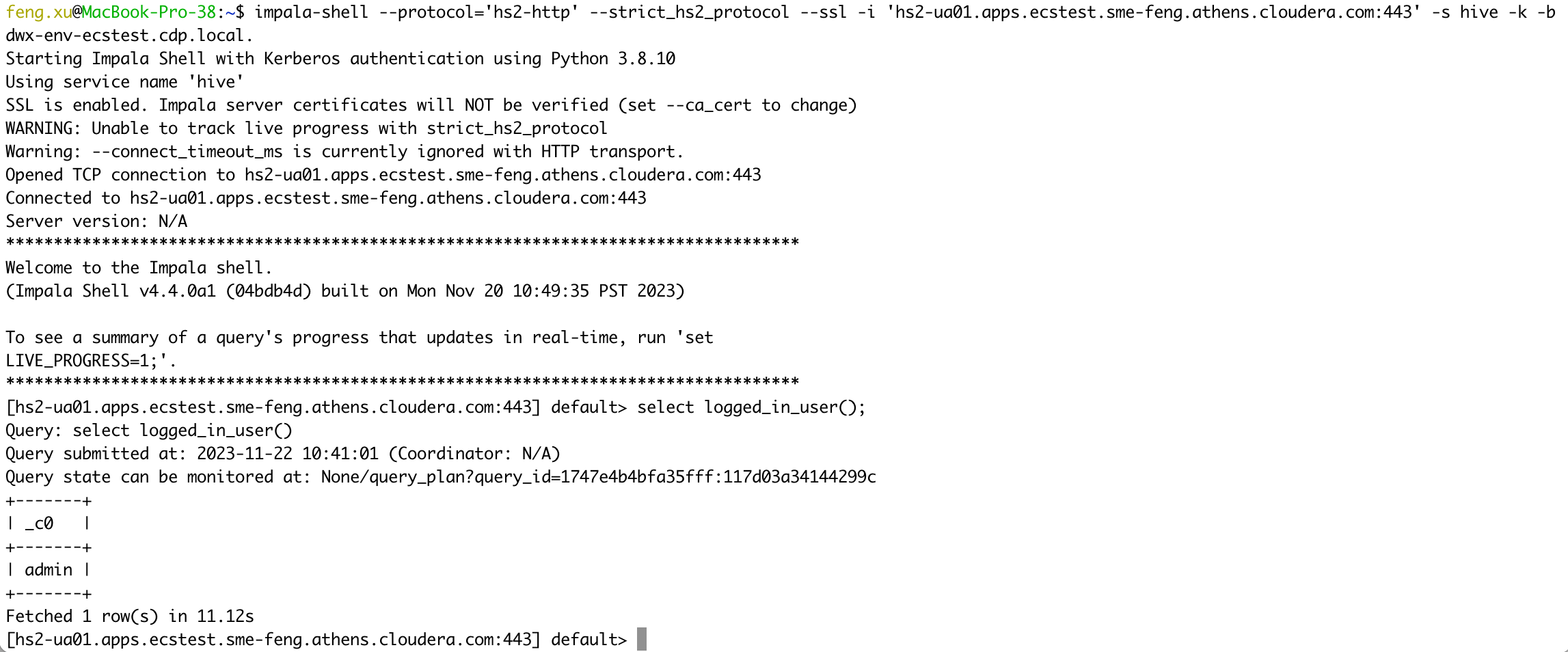
- 2) Verify UA server certificates
kubectl get secret -n vault-system vault-server-tls -o jsonpath="{.data['vault\.ca']}"| base64 --decode > vault.ca
kinit admin
impala-shell --protocol='hs2-http' --strict_hs2_protocol --ssl -i 'hs2-ua01.apps.ecstest.sme-feng.athens.cloudera.com:443' -s hive -k -b dwx-env-ecstest.cdp.local. --ca_cert=./vault.ca
select logged_in_user();
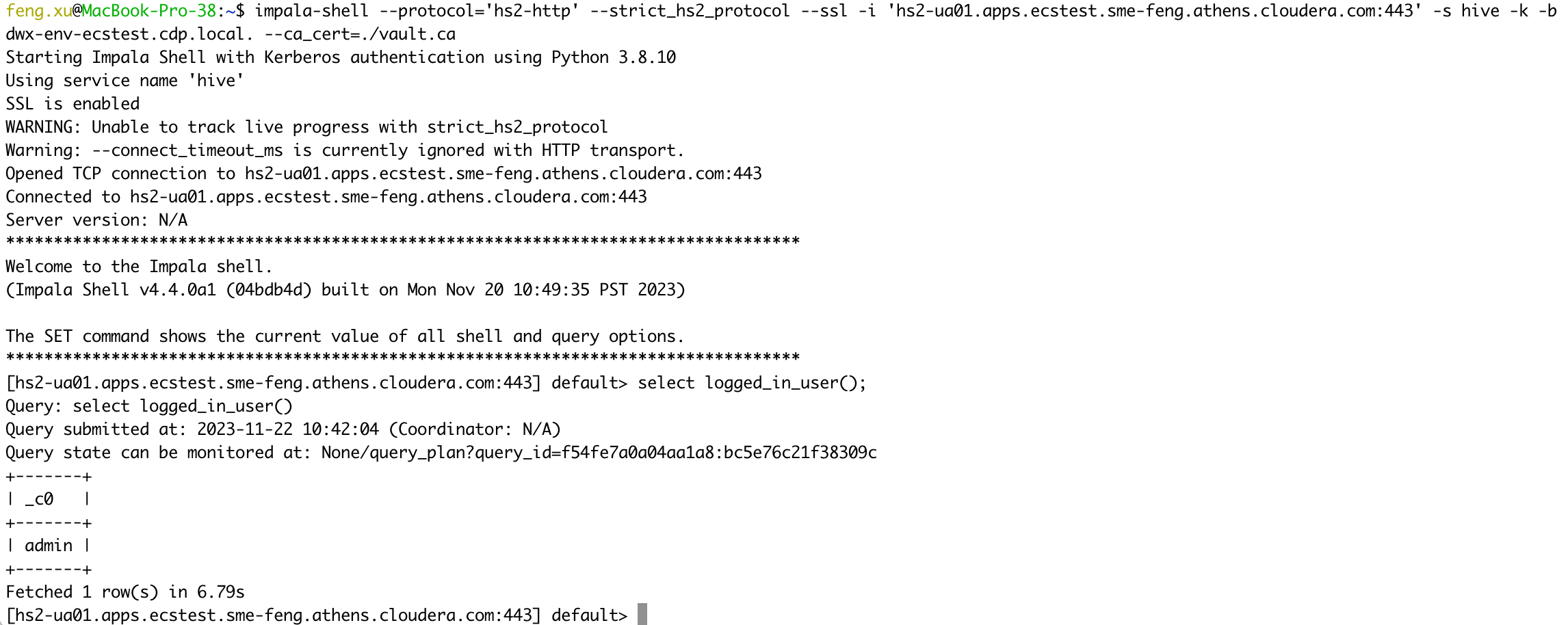
5.6 Case 16 - Unified Analytics(CDW) + LDAP auth
Connect to Unified Analytics VW in PvC CDW using LDAP authentication.
1) NOT Verify UA server certificates
impala-shell --protocol='hs2-http' --strict_hs2_protocol --ssl -i 'hs2-ua01.apps.ecstest.sme-feng.athens.cloudera.com:443' -u cdw01 -l
select logged_in_user();
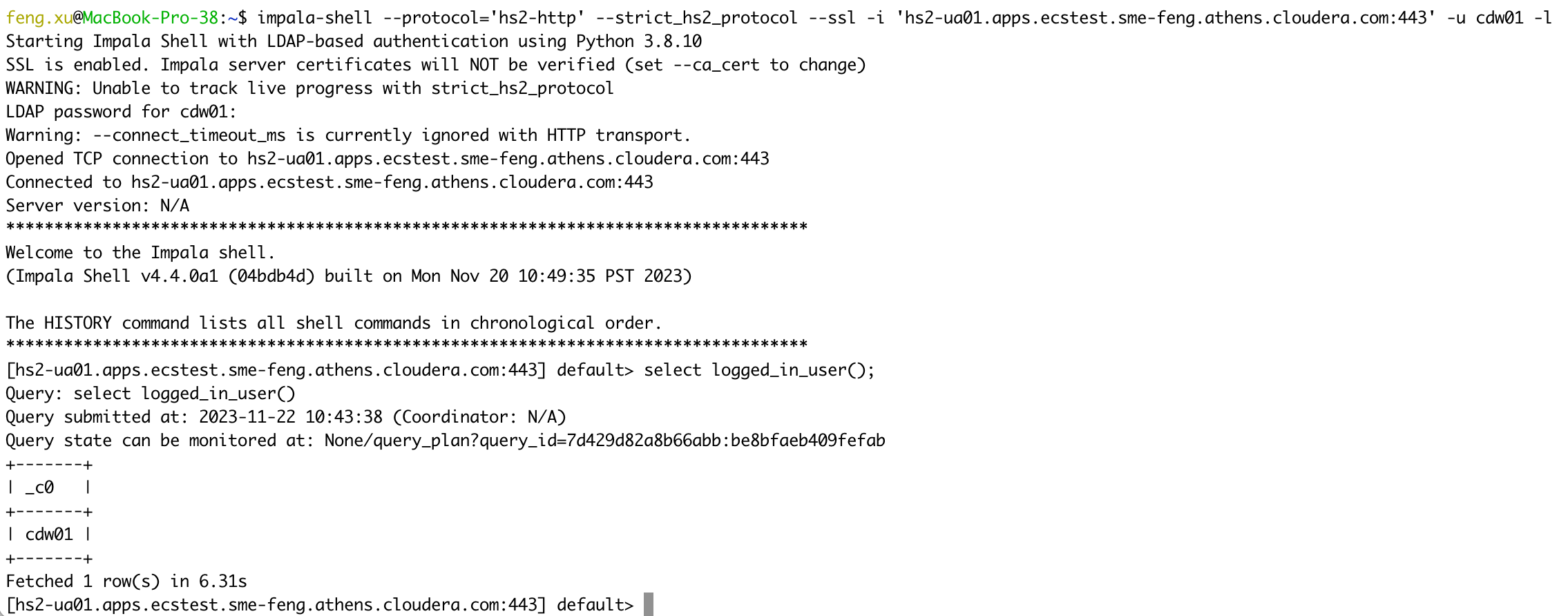
- 2) Verify UA server certificates
kubectl get secret -n vault-system vault-server-tls -o jsonpath="{.data['vault\.ca']}"| base64 --decode > vault.ca
impala-shell --protocol='hs2-http' --strict_hs2_protocol --ssl -i 'hs2-ua01.apps.ecstest.sme-feng.athens.cloudera.com:443' -u cdw01 -l --ca_cert=./vault.ca
select logged_in_user();
